The Role of Social Media in the Development of Entrepreneurial Intentions
VerifiedAdded on 2023/03/23
|21
|4931
|46
AI Summary
This research proposal aims to analyze the relationship between social media interaction and the development of entrepreneurial intentions among soon-to-be graduates. It explores the impact of social media on self-efficacy and the role of social media in shaping career choices. The study uses a quantitative research design and is expected to be completed within 24 weeks.
Contribute Materials
Your contribution can guide someone’s learning journey. Share your
documents today.
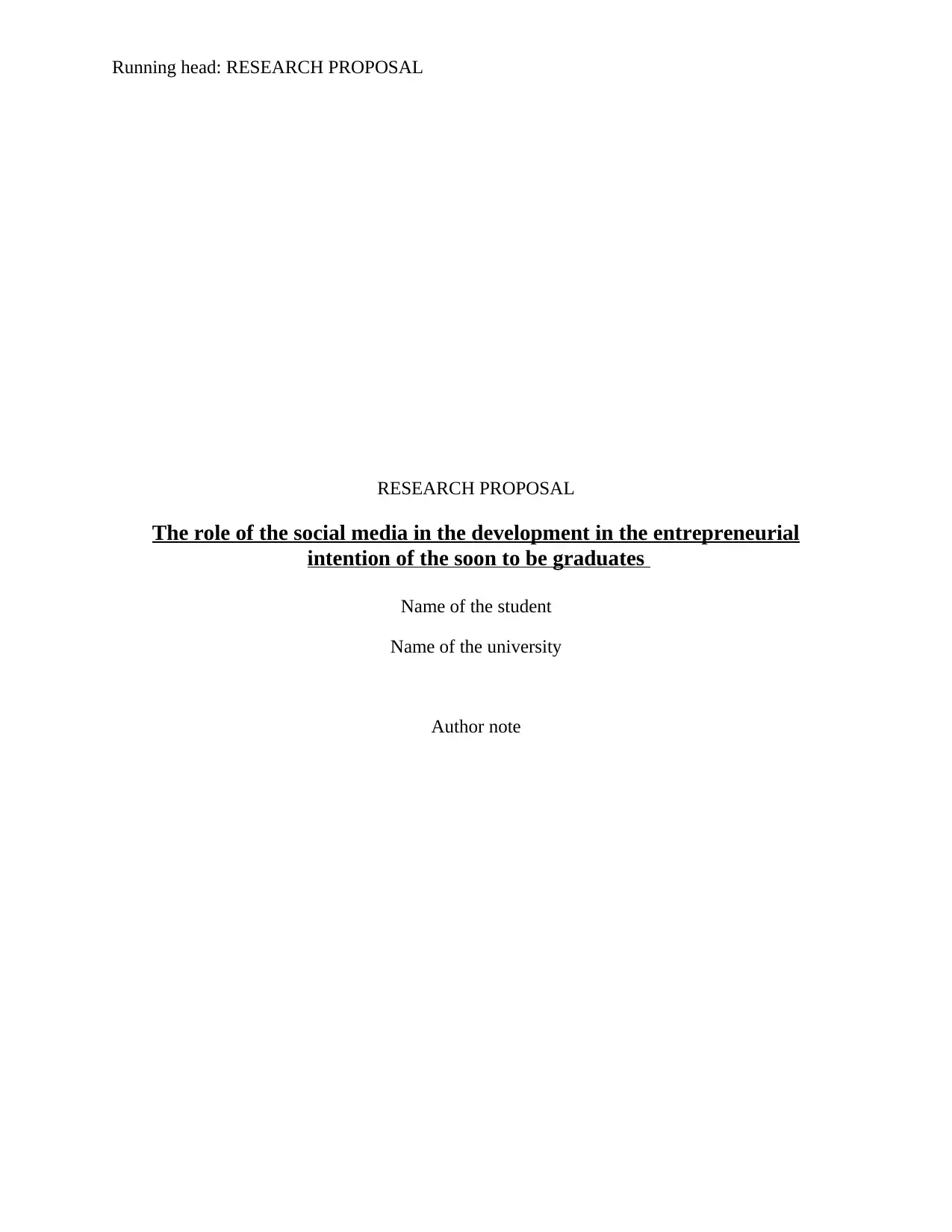
Running head: RESEARCH PROPOSAL
RESEARCH PROPOSAL
The role of the social media in the development in the entrepreneurial
intention of the soon to be graduates
Name of the student
Name of the university
Author note
RESEARCH PROPOSAL
The role of the social media in the development in the entrepreneurial
intention of the soon to be graduates
Name of the student
Name of the university
Author note
Secure Best Marks with AI Grader
Need help grading? Try our AI Grader for instant feedback on your assignments.
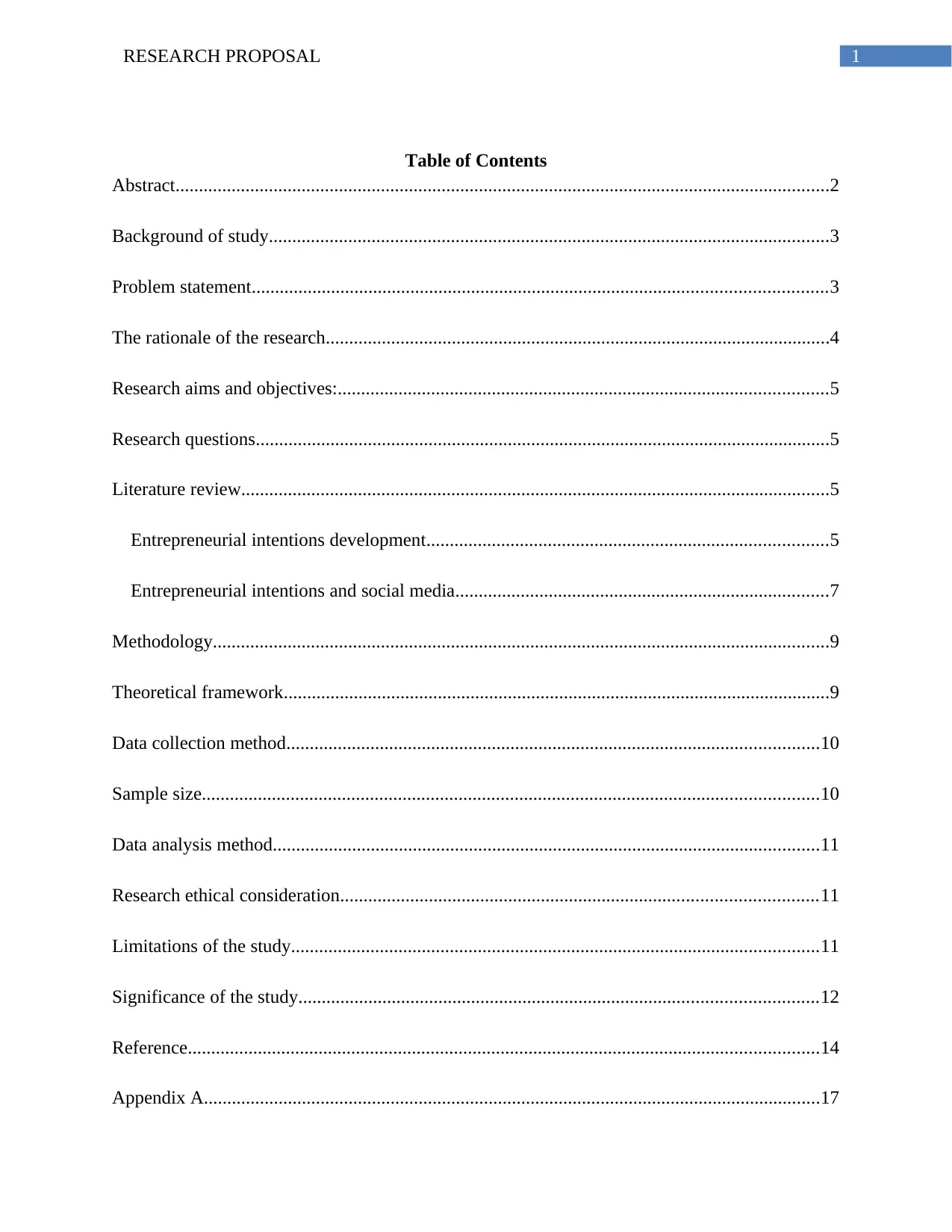
1RESEARCH PROPOSAL
Table of Contents
Abstract............................................................................................................................................2
Background of study........................................................................................................................3
Problem statement...........................................................................................................................3
The rationale of the research............................................................................................................4
Research aims and objectives:.........................................................................................................5
Research questions...........................................................................................................................5
Literature review..............................................................................................................................5
Entrepreneurial intentions development......................................................................................5
Entrepreneurial intentions and social media................................................................................7
Methodology....................................................................................................................................9
Theoretical framework.....................................................................................................................9
Data collection method..................................................................................................................10
Sample size....................................................................................................................................10
Data analysis method.....................................................................................................................11
Research ethical consideration......................................................................................................11
Limitations of the study.................................................................................................................11
Significance of the study...............................................................................................................12
Reference.......................................................................................................................................14
Appendix A....................................................................................................................................17
Table of Contents
Abstract............................................................................................................................................2
Background of study........................................................................................................................3
Problem statement...........................................................................................................................3
The rationale of the research............................................................................................................4
Research aims and objectives:.........................................................................................................5
Research questions...........................................................................................................................5
Literature review..............................................................................................................................5
Entrepreneurial intentions development......................................................................................5
Entrepreneurial intentions and social media................................................................................7
Methodology....................................................................................................................................9
Theoretical framework.....................................................................................................................9
Data collection method..................................................................................................................10
Sample size....................................................................................................................................10
Data analysis method.....................................................................................................................11
Research ethical consideration......................................................................................................11
Limitations of the study.................................................................................................................11
Significance of the study...............................................................................................................12
Reference.......................................................................................................................................14
Appendix A....................................................................................................................................17
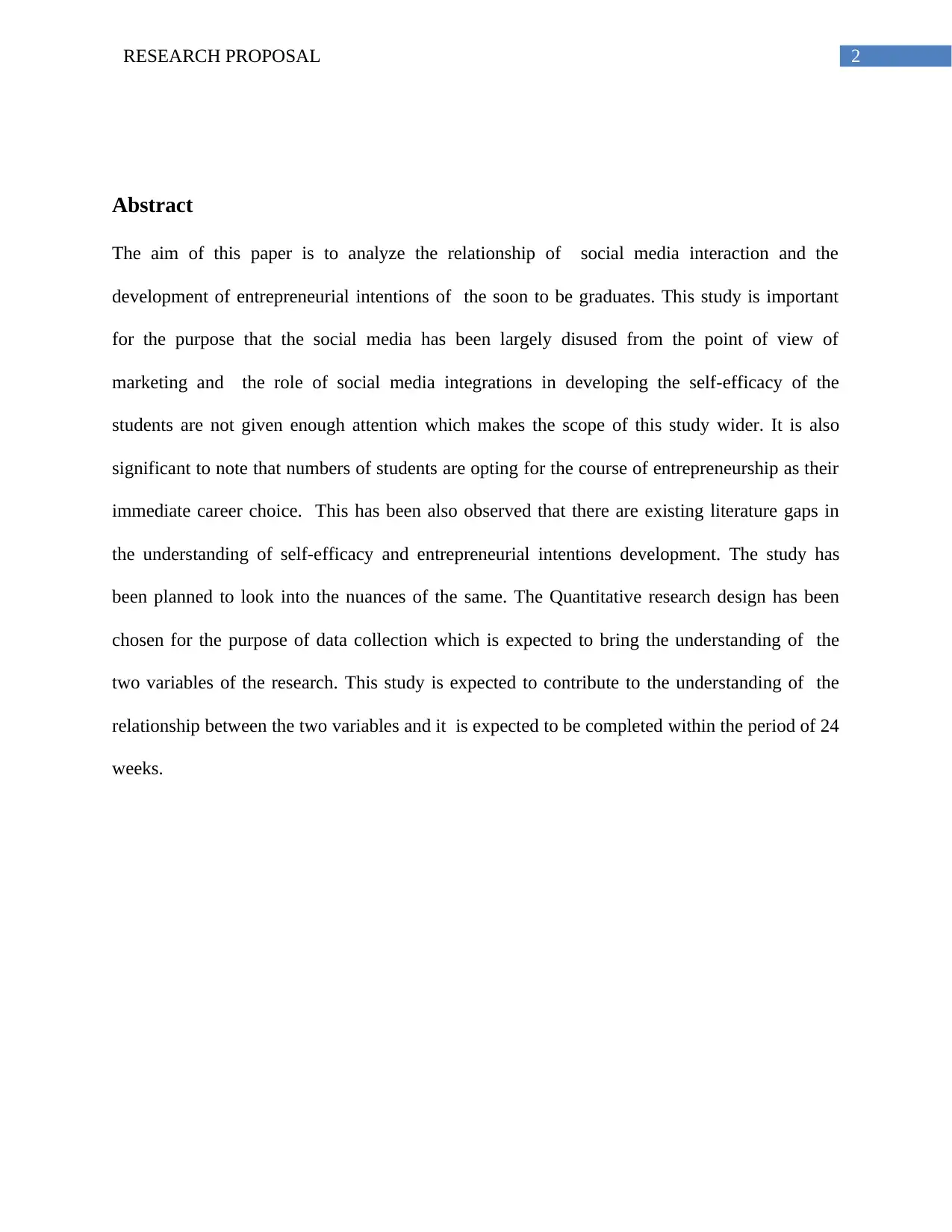
2RESEARCH PROPOSAL
Abstract
The aim of this paper is to analyze the relationship of social media interaction and the
development of entrepreneurial intentions of the soon to be graduates. This study is important
for the purpose that the social media has been largely disused from the point of view of
marketing and the role of social media integrations in developing the self-efficacy of the
students are not given enough attention which makes the scope of this study wider. It is also
significant to note that numbers of students are opting for the course of entrepreneurship as their
immediate career choice. This has been also observed that there are existing literature gaps in
the understanding of self-efficacy and entrepreneurial intentions development. The study has
been planned to look into the nuances of the same. The Quantitative research design has been
chosen for the purpose of data collection which is expected to bring the understanding of the
two variables of the research. This study is expected to contribute to the understanding of the
relationship between the two variables and it is expected to be completed within the period of 24
weeks.
Abstract
The aim of this paper is to analyze the relationship of social media interaction and the
development of entrepreneurial intentions of the soon to be graduates. This study is important
for the purpose that the social media has been largely disused from the point of view of
marketing and the role of social media integrations in developing the self-efficacy of the
students are not given enough attention which makes the scope of this study wider. It is also
significant to note that numbers of students are opting for the course of entrepreneurship as their
immediate career choice. This has been also observed that there are existing literature gaps in
the understanding of self-efficacy and entrepreneurial intentions development. The study has
been planned to look into the nuances of the same. The Quantitative research design has been
chosen for the purpose of data collection which is expected to bring the understanding of the
two variables of the research. This study is expected to contribute to the understanding of the
relationship between the two variables and it is expected to be completed within the period of 24
weeks.
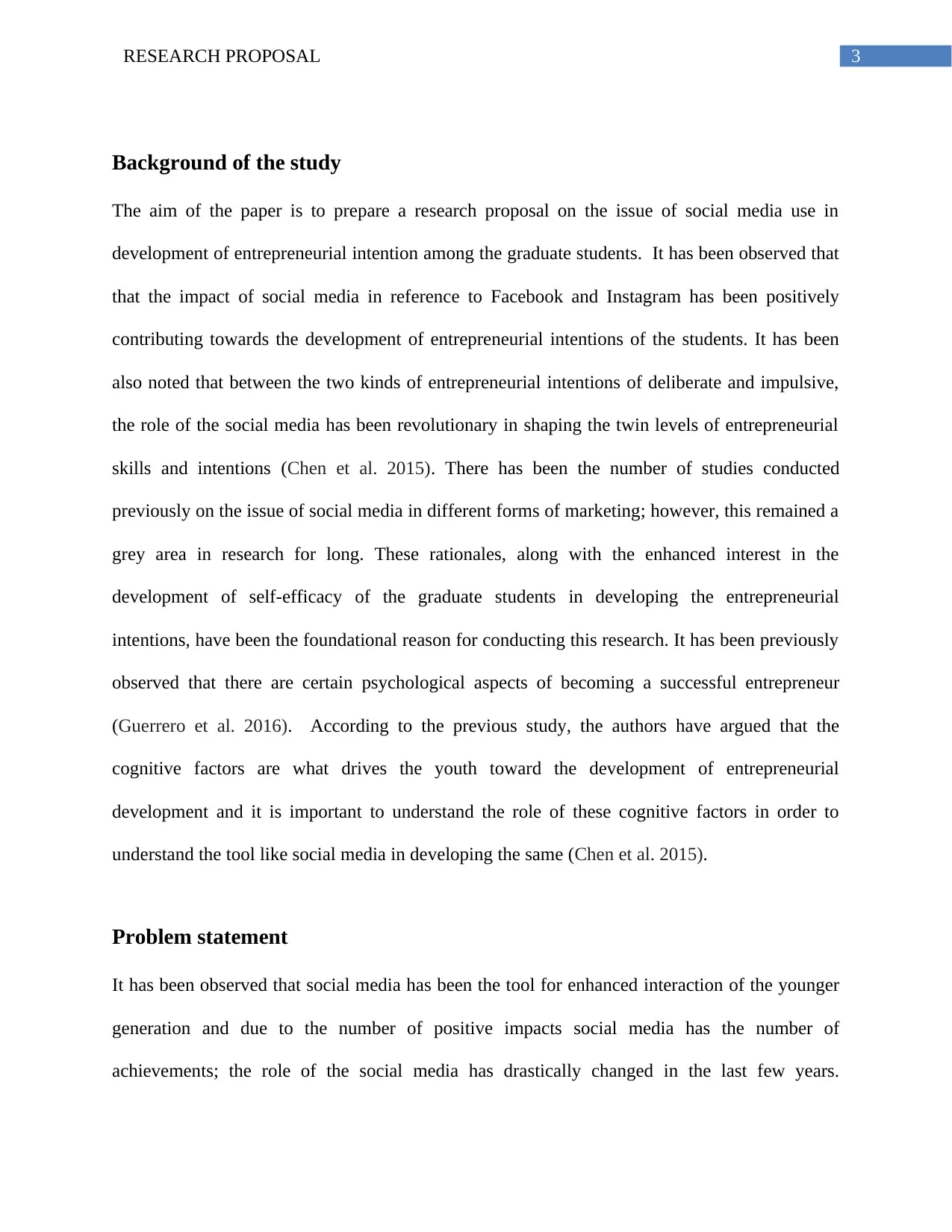
3RESEARCH PROPOSAL
Background of the study
The aim of the paper is to prepare a research proposal on the issue of social media use in
development of entrepreneurial intention among the graduate students. It has been observed that
that the impact of social media in reference to Facebook and Instagram has been positively
contributing towards the development of entrepreneurial intentions of the students. It has been
also noted that between the two kinds of entrepreneurial intentions of deliberate and impulsive,
the role of the social media has been revolutionary in shaping the twin levels of entrepreneurial
skills and intentions (Chen et al. 2015). There has been the number of studies conducted
previously on the issue of social media in different forms of marketing; however, this remained a
grey area in research for long. These rationales, along with the enhanced interest in the
development of self-efficacy of the graduate students in developing the entrepreneurial
intentions, have been the foundational reason for conducting this research. It has been previously
observed that there are certain psychological aspects of becoming a successful entrepreneur
(Guerrero et al. 2016). According to the previous study, the authors have argued that the
cognitive factors are what drives the youth toward the development of entrepreneurial
development and it is important to understand the role of these cognitive factors in order to
understand the tool like social media in developing the same (Chen et al. 2015).
Problem statement
It has been observed that social media has been the tool for enhanced interaction of the younger
generation and due to the number of positive impacts social media has the number of
achievements; the role of the social media has drastically changed in the last few years.
Background of the study
The aim of the paper is to prepare a research proposal on the issue of social media use in
development of entrepreneurial intention among the graduate students. It has been observed that
that the impact of social media in reference to Facebook and Instagram has been positively
contributing towards the development of entrepreneurial intentions of the students. It has been
also noted that between the two kinds of entrepreneurial intentions of deliberate and impulsive,
the role of the social media has been revolutionary in shaping the twin levels of entrepreneurial
skills and intentions (Chen et al. 2015). There has been the number of studies conducted
previously on the issue of social media in different forms of marketing; however, this remained a
grey area in research for long. These rationales, along with the enhanced interest in the
development of self-efficacy of the graduate students in developing the entrepreneurial
intentions, have been the foundational reason for conducting this research. It has been previously
observed that there are certain psychological aspects of becoming a successful entrepreneur
(Guerrero et al. 2016). According to the previous study, the authors have argued that the
cognitive factors are what drives the youth toward the development of entrepreneurial
development and it is important to understand the role of these cognitive factors in order to
understand the tool like social media in developing the same (Chen et al. 2015).
Problem statement
It has been observed that social media has been the tool for enhanced interaction of the younger
generation and due to the number of positive impacts social media has the number of
achievements; the role of the social media has drastically changed in the last few years.
Secure Best Marks with AI Grader
Need help grading? Try our AI Grader for instant feedback on your assignments.
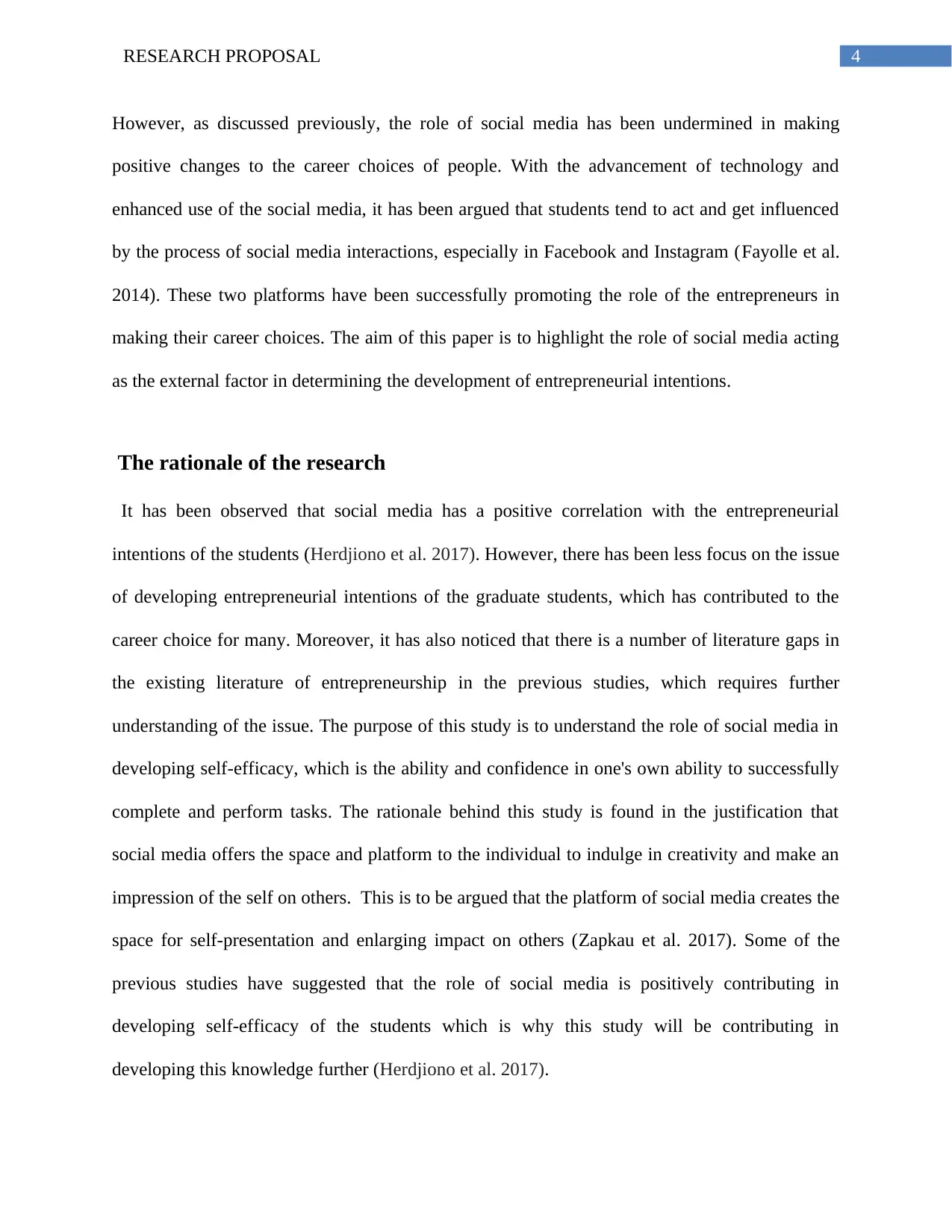
4RESEARCH PROPOSAL
However, as discussed previously, the role of social media has been undermined in making
positive changes to the career choices of people. With the advancement of technology and
enhanced use of the social media, it has been argued that students tend to act and get influenced
by the process of social media interactions, especially in Facebook and Instagram (Fayolle et al.
2014). These two platforms have been successfully promoting the role of the entrepreneurs in
making their career choices. The aim of this paper is to highlight the role of social media acting
as the external factor in determining the development of entrepreneurial intentions.
The rationale of the research
It has been observed that social media has a positive correlation with the entrepreneurial
intentions of the students (Herdjiono et al. 2017). However, there has been less focus on the issue
of developing entrepreneurial intentions of the graduate students, which has contributed to the
career choice for many. Moreover, it has also noticed that there is a number of literature gaps in
the existing literature of entrepreneurship in the previous studies, which requires further
understanding of the issue. The purpose of this study is to understand the role of social media in
developing self-efficacy, which is the ability and confidence in one's own ability to successfully
complete and perform tasks. The rationale behind this study is found in the justification that
social media offers the space and platform to the individual to indulge in creativity and make an
impression of the self on others. This is to be argued that the platform of social media creates the
space for self-presentation and enlarging impact on others (Zapkau et al. 2017). Some of the
previous studies have suggested that the role of social media is positively contributing in
developing self-efficacy of the students which is why this study will be contributing in
developing this knowledge further (Herdjiono et al. 2017).
However, as discussed previously, the role of social media has been undermined in making
positive changes to the career choices of people. With the advancement of technology and
enhanced use of the social media, it has been argued that students tend to act and get influenced
by the process of social media interactions, especially in Facebook and Instagram (Fayolle et al.
2014). These two platforms have been successfully promoting the role of the entrepreneurs in
making their career choices. The aim of this paper is to highlight the role of social media acting
as the external factor in determining the development of entrepreneurial intentions.
The rationale of the research
It has been observed that social media has a positive correlation with the entrepreneurial
intentions of the students (Herdjiono et al. 2017). However, there has been less focus on the issue
of developing entrepreneurial intentions of the graduate students, which has contributed to the
career choice for many. Moreover, it has also noticed that there is a number of literature gaps in
the existing literature of entrepreneurship in the previous studies, which requires further
understanding of the issue. The purpose of this study is to understand the role of social media in
developing self-efficacy, which is the ability and confidence in one's own ability to successfully
complete and perform tasks. The rationale behind this study is found in the justification that
social media offers the space and platform to the individual to indulge in creativity and make an
impression of the self on others. This is to be argued that the platform of social media creates the
space for self-presentation and enlarging impact on others (Zapkau et al. 2017). Some of the
previous studies have suggested that the role of social media is positively contributing in
developing self-efficacy of the students which is why this study will be contributing in
developing this knowledge further (Herdjiono et al. 2017).
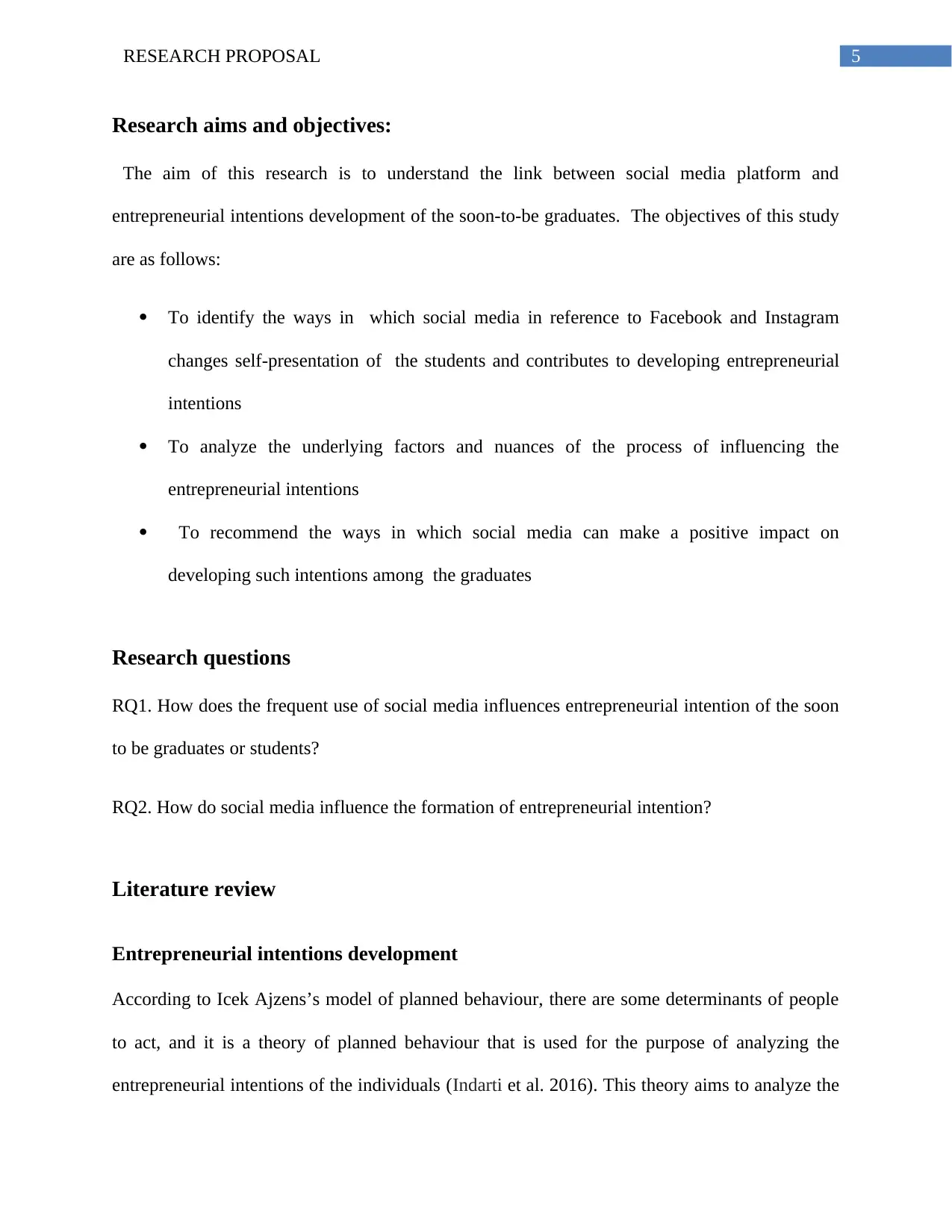
5RESEARCH PROPOSAL
Research aims and objectives:
The aim of this research is to understand the link between social media platform and
entrepreneurial intentions development of the soon-to-be graduates. The objectives of this study
are as follows:
To identify the ways in which social media in reference to Facebook and Instagram
changes self-presentation of the students and contributes to developing entrepreneurial
intentions
To analyze the underlying factors and nuances of the process of influencing the
entrepreneurial intentions
To recommend the ways in which social media can make a positive impact on
developing such intentions among the graduates
Research questions
RQ1. How does the frequent use of social media influences entrepreneurial intention of the soon
to be graduates or students?
RQ2. How do social media influence the formation of entrepreneurial intention?
Literature review
Entrepreneurial intentions development
According to Icek Ajzens’s model of planned behaviour, there are some determinants of people
to act, and it is a theory of planned behaviour that is used for the purpose of analyzing the
entrepreneurial intentions of the individuals (Indarti et al. 2016). This theory aims to analyze the
Research aims and objectives:
The aim of this research is to understand the link between social media platform and
entrepreneurial intentions development of the soon-to-be graduates. The objectives of this study
are as follows:
To identify the ways in which social media in reference to Facebook and Instagram
changes self-presentation of the students and contributes to developing entrepreneurial
intentions
To analyze the underlying factors and nuances of the process of influencing the
entrepreneurial intentions
To recommend the ways in which social media can make a positive impact on
developing such intentions among the graduates
Research questions
RQ1. How does the frequent use of social media influences entrepreneurial intention of the soon
to be graduates or students?
RQ2. How do social media influence the formation of entrepreneurial intention?
Literature review
Entrepreneurial intentions development
According to Icek Ajzens’s model of planned behaviour, there are some determinants of people
to act, and it is a theory of planned behaviour that is used for the purpose of analyzing the
entrepreneurial intentions of the individuals (Indarti et al. 2016). This theory aims to analyze the
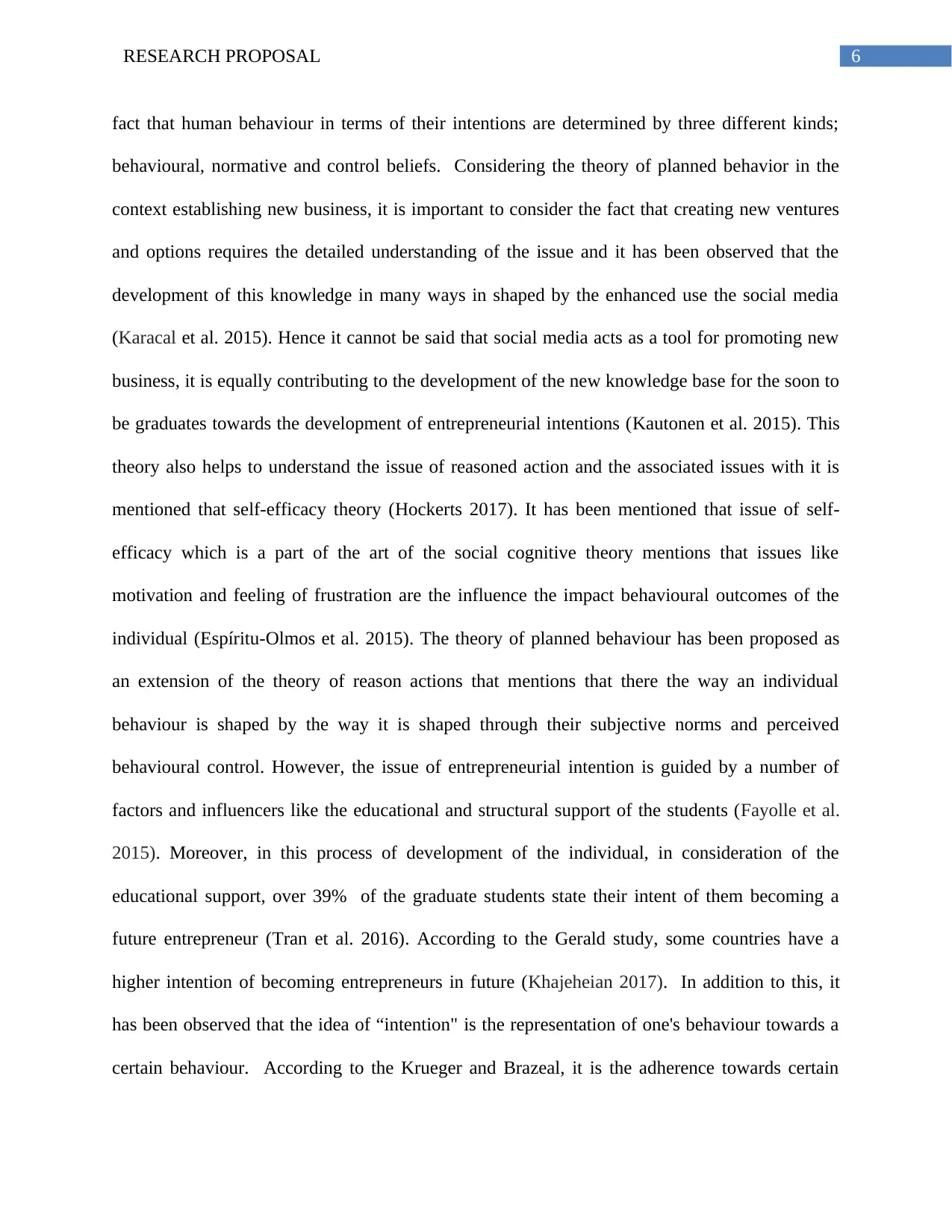
6RESEARCH PROPOSAL
fact that human behaviour in terms of their intentions are determined by three different kinds;
behavioural, normative and control beliefs. Considering the theory of planned behavior in the
context establishing new business, it is important to consider the fact that creating new ventures
and options requires the detailed understanding of the issue and it has been observed that the
development of this knowledge in many ways in shaped by the enhanced use the social media
(Karacal et al. 2015). Hence it cannot be said that social media acts as a tool for promoting new
business, it is equally contributing to the development of the new knowledge base for the soon to
be graduates towards the development of entrepreneurial intentions (Kautonen et al. 2015). This
theory also helps to understand the issue of reasoned action and the associated issues with it is
mentioned that self-efficacy theory (Hockerts 2017). It has been mentioned that issue of self-
efficacy which is a part of the art of the social cognitive theory mentions that issues like
motivation and feeling of frustration are the influence the impact behavioural outcomes of the
individual (Espíritu-Olmos et al. 2015). The theory of planned behaviour has been proposed as
an extension of the theory of reason actions that mentions that there the way an individual
behaviour is shaped by the way it is shaped through their subjective norms and perceived
behavioural control. However, the issue of entrepreneurial intention is guided by a number of
factors and influencers like the educational and structural support of the students (Fayolle et al.
2015). Moreover, in this process of development of the individual, in consideration of the
educational support, over 39% of the graduate students state their intent of them becoming a
future entrepreneur (Tran et al. 2016). According to the Gerald study, some countries have a
higher intention of becoming entrepreneurs in future (Khajeheian 2017). In addition to this, it
has been observed that the idea of “intention" is the representation of one's behaviour towards a
certain behaviour. According to the Krueger and Brazeal, it is the adherence towards certain
fact that human behaviour in terms of their intentions are determined by three different kinds;
behavioural, normative and control beliefs. Considering the theory of planned behavior in the
context establishing new business, it is important to consider the fact that creating new ventures
and options requires the detailed understanding of the issue and it has been observed that the
development of this knowledge in many ways in shaped by the enhanced use the social media
(Karacal et al. 2015). Hence it cannot be said that social media acts as a tool for promoting new
business, it is equally contributing to the development of the new knowledge base for the soon to
be graduates towards the development of entrepreneurial intentions (Kautonen et al. 2015). This
theory also helps to understand the issue of reasoned action and the associated issues with it is
mentioned that self-efficacy theory (Hockerts 2017). It has been mentioned that issue of self-
efficacy which is a part of the art of the social cognitive theory mentions that issues like
motivation and feeling of frustration are the influence the impact behavioural outcomes of the
individual (Espíritu-Olmos et al. 2015). The theory of planned behaviour has been proposed as
an extension of the theory of reason actions that mentions that there the way an individual
behaviour is shaped by the way it is shaped through their subjective norms and perceived
behavioural control. However, the issue of entrepreneurial intention is guided by a number of
factors and influencers like the educational and structural support of the students (Fayolle et al.
2015). Moreover, in this process of development of the individual, in consideration of the
educational support, over 39% of the graduate students state their intent of them becoming a
future entrepreneur (Tran et al. 2016). According to the Gerald study, some countries have a
higher intention of becoming entrepreneurs in future (Khajeheian 2017). In addition to this, it
has been observed that the idea of “intention" is the representation of one's behaviour towards a
certain behaviour. According to the Krueger and Brazeal, it is the adherence towards certain
Paraphrase This Document
Need a fresh take? Get an instant paraphrase of this document with our AI Paraphraser
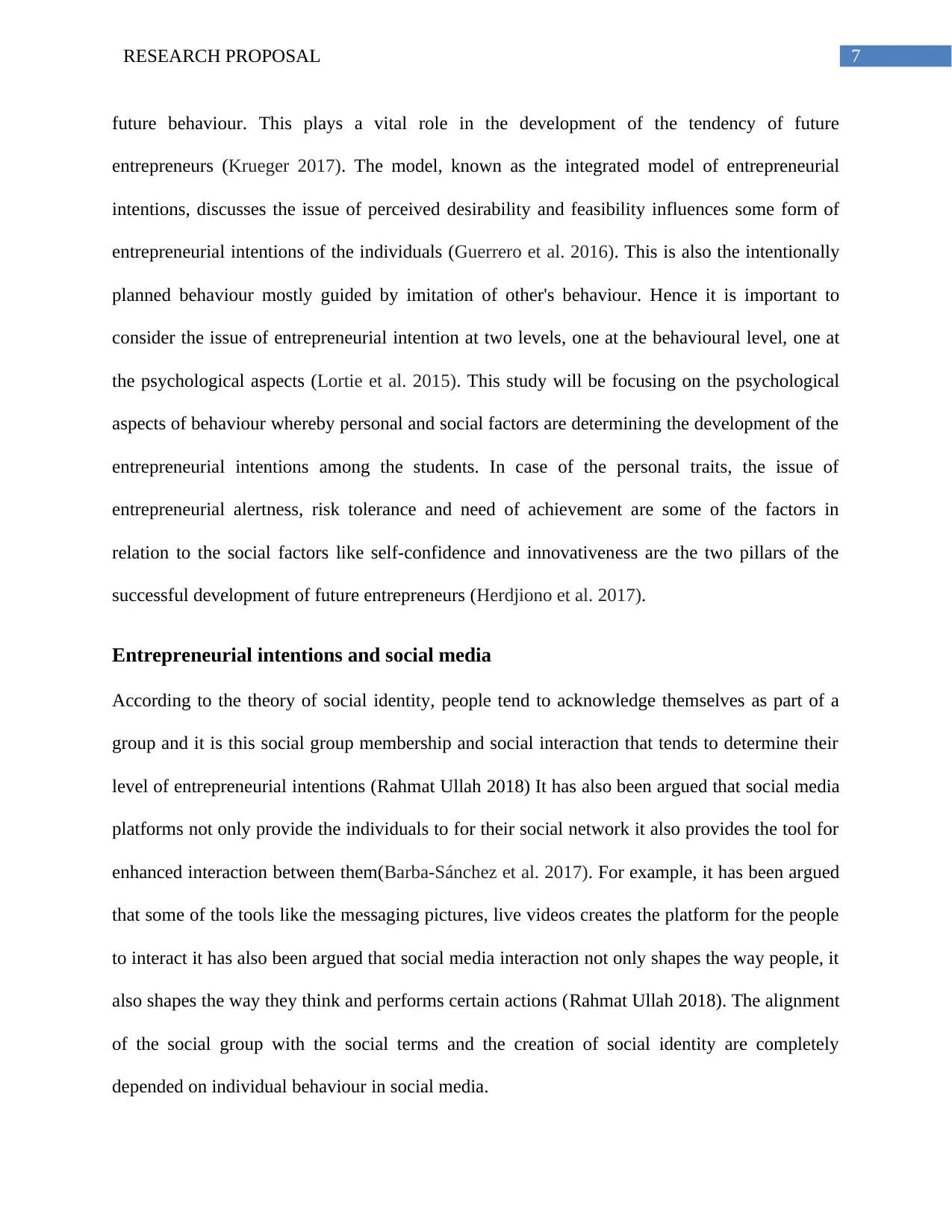
7RESEARCH PROPOSAL
future behaviour. This plays a vital role in the development of the tendency of future
entrepreneurs (Krueger 2017). The model, known as the integrated model of entrepreneurial
intentions, discusses the issue of perceived desirability and feasibility influences some form of
entrepreneurial intentions of the individuals (Guerrero et al. 2016). This is also the intentionally
planned behaviour mostly guided by imitation of other's behaviour. Hence it is important to
consider the issue of entrepreneurial intention at two levels, one at the behavioural level, one at
the psychological aspects (Lortie et al. 2015). This study will be focusing on the psychological
aspects of behaviour whereby personal and social factors are determining the development of the
entrepreneurial intentions among the students. In case of the personal traits, the issue of
entrepreneurial alertness, risk tolerance and need of achievement are some of the factors in
relation to the social factors like self-confidence and innovativeness are the two pillars of the
successful development of future entrepreneurs (Herdjiono et al. 2017).
Entrepreneurial intentions and social media
According to the theory of social identity, people tend to acknowledge themselves as part of a
group and it is this social group membership and social interaction that tends to determine their
level of entrepreneurial intentions (Rahmat Ullah 2018) It has also been argued that social media
platforms not only provide the individuals to for their social network it also provides the tool for
enhanced interaction between them(Barba-Sánchez et al. 2017). For example, it has been argued
that some of the tools like the messaging pictures, live videos creates the platform for the people
to interact it has also been argued that social media interaction not only shapes the way people, it
also shapes the way they think and performs certain actions (Rahmat Ullah 2018). The alignment
of the social group with the social terms and the creation of social identity are completely
depended on individual behaviour in social media.
future behaviour. This plays a vital role in the development of the tendency of future
entrepreneurs (Krueger 2017). The model, known as the integrated model of entrepreneurial
intentions, discusses the issue of perceived desirability and feasibility influences some form of
entrepreneurial intentions of the individuals (Guerrero et al. 2016). This is also the intentionally
planned behaviour mostly guided by imitation of other's behaviour. Hence it is important to
consider the issue of entrepreneurial intention at two levels, one at the behavioural level, one at
the psychological aspects (Lortie et al. 2015). This study will be focusing on the psychological
aspects of behaviour whereby personal and social factors are determining the development of the
entrepreneurial intentions among the students. In case of the personal traits, the issue of
entrepreneurial alertness, risk tolerance and need of achievement are some of the factors in
relation to the social factors like self-confidence and innovativeness are the two pillars of the
successful development of future entrepreneurs (Herdjiono et al. 2017).
Entrepreneurial intentions and social media
According to the theory of social identity, people tend to acknowledge themselves as part of a
group and it is this social group membership and social interaction that tends to determine their
level of entrepreneurial intentions (Rahmat Ullah 2018) It has also been argued that social media
platforms not only provide the individuals to for their social network it also provides the tool for
enhanced interaction between them(Barba-Sánchez et al. 2017). For example, it has been argued
that some of the tools like the messaging pictures, live videos creates the platform for the people
to interact it has also been argued that social media interaction not only shapes the way people, it
also shapes the way they think and performs certain actions (Rahmat Ullah 2018). The alignment
of the social group with the social terms and the creation of social identity are completely
depended on individual behaviour in social media.
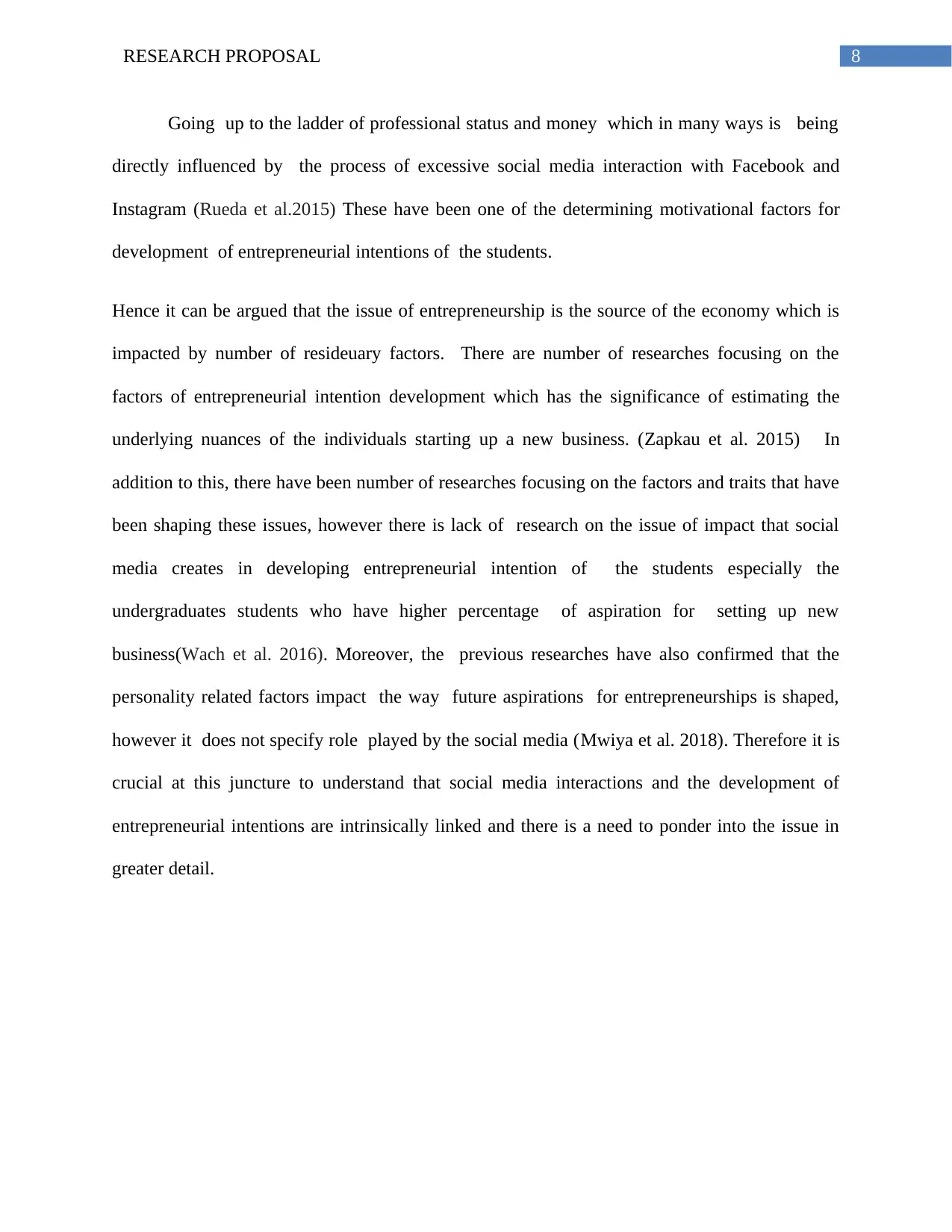
8RESEARCH PROPOSAL
Going up to the ladder of professional status and money which in many ways is being
directly influenced by the process of excessive social media interaction with Facebook and
Instagram (Rueda et al.2015) These have been one of the determining motivational factors for
development of entrepreneurial intentions of the students.
Hence it can be argued that the issue of entrepreneurship is the source of the economy which is
impacted by number of resideuary factors. There are number of researches focusing on the
factors of entrepreneurial intention development which has the significance of estimating the
underlying nuances of the individuals starting up a new business. (Zapkau et al. 2015) In
addition to this, there have been number of researches focusing on the factors and traits that have
been shaping these issues, however there is lack of research on the issue of impact that social
media creates in developing entrepreneurial intention of the students especially the
undergraduates students who have higher percentage of aspiration for setting up new
business(Wach et al. 2016). Moreover, the previous researches have also confirmed that the
personality related factors impact the way future aspirations for entrepreneurships is shaped,
however it does not specify role played by the social media (Mwiya et al. 2018). Therefore it is
crucial at this juncture to understand that social media interactions and the development of
entrepreneurial intentions are intrinsically linked and there is a need to ponder into the issue in
greater detail.
Going up to the ladder of professional status and money which in many ways is being
directly influenced by the process of excessive social media interaction with Facebook and
Instagram (Rueda et al.2015) These have been one of the determining motivational factors for
development of entrepreneurial intentions of the students.
Hence it can be argued that the issue of entrepreneurship is the source of the economy which is
impacted by number of resideuary factors. There are number of researches focusing on the
factors of entrepreneurial intention development which has the significance of estimating the
underlying nuances of the individuals starting up a new business. (Zapkau et al. 2015) In
addition to this, there have been number of researches focusing on the factors and traits that have
been shaping these issues, however there is lack of research on the issue of impact that social
media creates in developing entrepreneurial intention of the students especially the
undergraduates students who have higher percentage of aspiration for setting up new
business(Wach et al. 2016). Moreover, the previous researches have also confirmed that the
personality related factors impact the way future aspirations for entrepreneurships is shaped,
however it does not specify role played by the social media (Mwiya et al. 2018). Therefore it is
crucial at this juncture to understand that social media interactions and the development of
entrepreneurial intentions are intrinsically linked and there is a need to ponder into the issue in
greater detail.
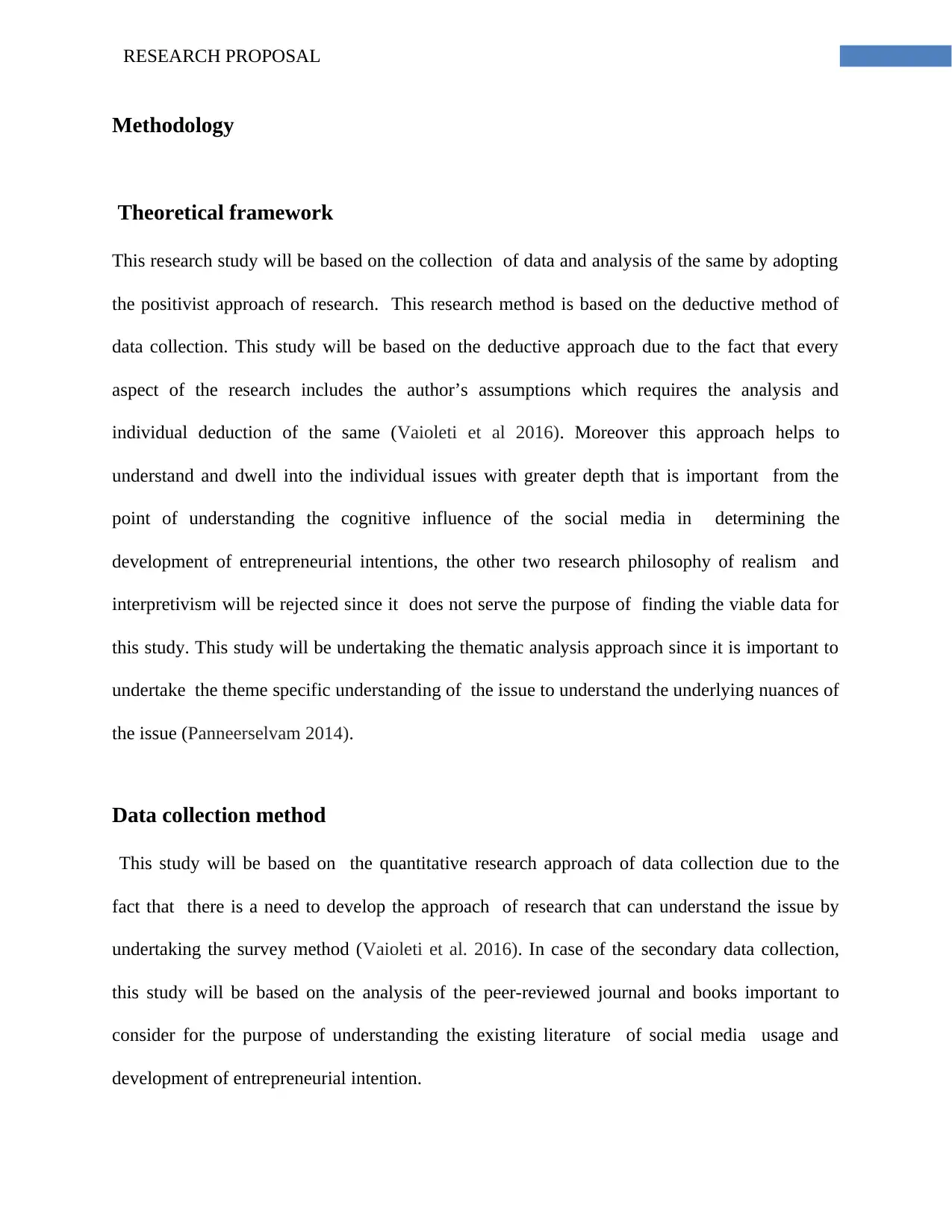
9RESEARCH PROPOSAL
Methodology
Theoretical framework
This research study will be based on the collection of data and analysis of the same by adopting
the positivist approach of research. This research method is based on the deductive method of
data collection. This study will be based on the deductive approach due to the fact that every
aspect of the research includes the author’s assumptions which requires the analysis and
individual deduction of the same (Vaioleti et al 2016). Moreover this approach helps to
understand and dwell into the individual issues with greater depth that is important from the
point of understanding the cognitive influence of the social media in determining the
development of entrepreneurial intentions, the other two research philosophy of realism and
interpretivism will be rejected since it does not serve the purpose of finding the viable data for
this study. This study will be undertaking the thematic analysis approach since it is important to
undertake the theme specific understanding of the issue to understand the underlying nuances of
the issue (Panneerselvam 2014).
Data collection method
This study will be based on the quantitative research approach of data collection due to the
fact that there is a need to develop the approach of research that can understand the issue by
undertaking the survey method (Vaioleti et al. 2016). In case of the secondary data collection,
this study will be based on the analysis of the peer-reviewed journal and books important to
consider for the purpose of understanding the existing literature of social media usage and
development of entrepreneurial intention.
Methodology
Theoretical framework
This research study will be based on the collection of data and analysis of the same by adopting
the positivist approach of research. This research method is based on the deductive method of
data collection. This study will be based on the deductive approach due to the fact that every
aspect of the research includes the author’s assumptions which requires the analysis and
individual deduction of the same (Vaioleti et al 2016). Moreover this approach helps to
understand and dwell into the individual issues with greater depth that is important from the
point of understanding the cognitive influence of the social media in determining the
development of entrepreneurial intentions, the other two research philosophy of realism and
interpretivism will be rejected since it does not serve the purpose of finding the viable data for
this study. This study will be undertaking the thematic analysis approach since it is important to
undertake the theme specific understanding of the issue to understand the underlying nuances of
the issue (Panneerselvam 2014).
Data collection method
This study will be based on the quantitative research approach of data collection due to the
fact that there is a need to develop the approach of research that can understand the issue by
undertaking the survey method (Vaioleti et al. 2016). In case of the secondary data collection,
this study will be based on the analysis of the peer-reviewed journal and books important to
consider for the purpose of understanding the existing literature of social media usage and
development of entrepreneurial intention.
Secure Best Marks with AI Grader
Need help grading? Try our AI Grader for instant feedback on your assignments.
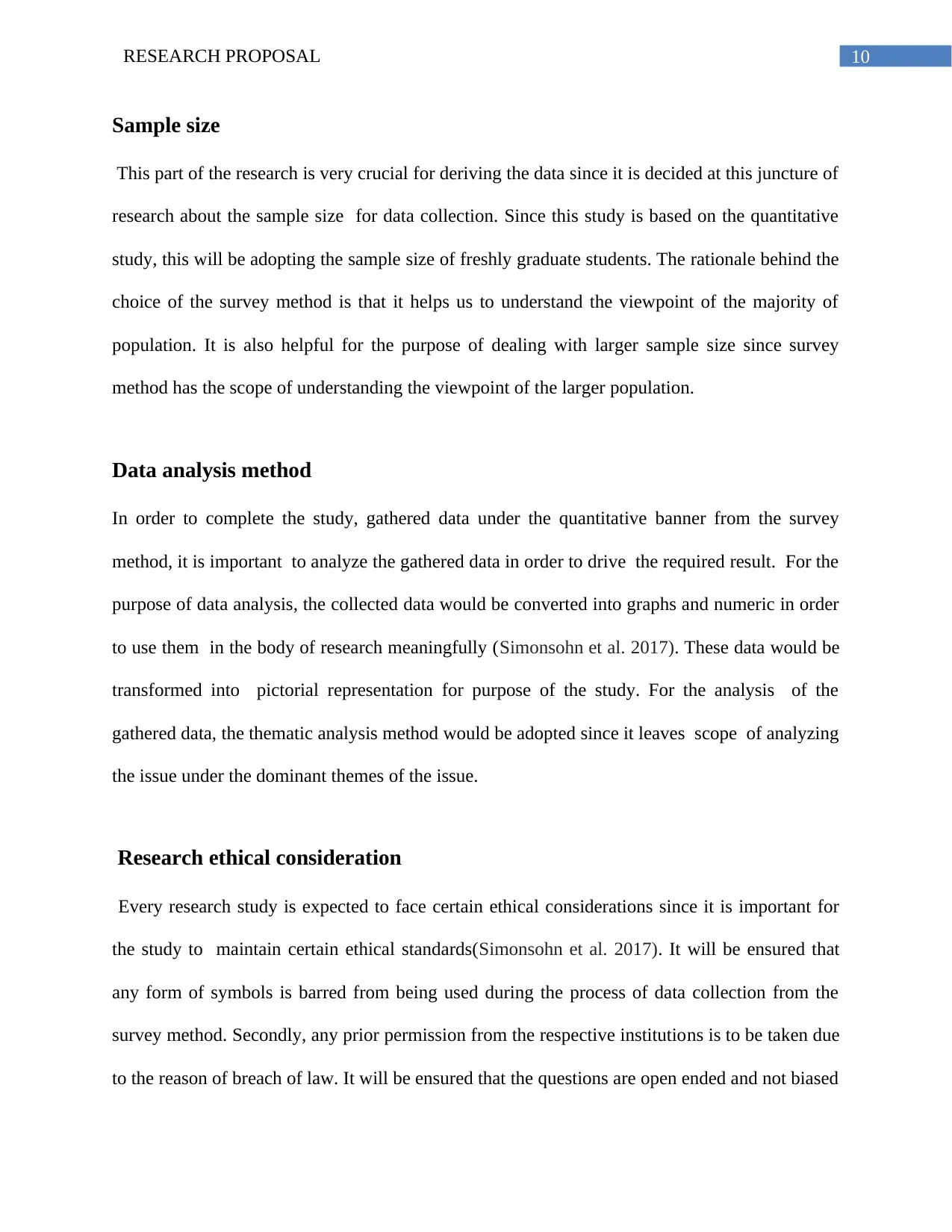
10RESEARCH PROPOSAL
Sample size
This part of the research is very crucial for deriving the data since it is decided at this juncture of
research about the sample size for data collection. Since this study is based on the quantitative
study, this will be adopting the sample size of freshly graduate students. The rationale behind the
choice of the survey method is that it helps us to understand the viewpoint of the majority of
population. It is also helpful for the purpose of dealing with larger sample size since survey
method has the scope of understanding the viewpoint of the larger population.
Data analysis method
In order to complete the study, gathered data under the quantitative banner from the survey
method, it is important to analyze the gathered data in order to drive the required result. For the
purpose of data analysis, the collected data would be converted into graphs and numeric in order
to use them in the body of research meaningfully (Simonsohn et al. 2017). These data would be
transformed into pictorial representation for purpose of the study. For the analysis of the
gathered data, the thematic analysis method would be adopted since it leaves scope of analyzing
the issue under the dominant themes of the issue.
Research ethical consideration
Every research study is expected to face certain ethical considerations since it is important for
the study to maintain certain ethical standards(Simonsohn et al. 2017). It will be ensured that
any form of symbols is barred from being used during the process of data collection from the
survey method. Secondly, any prior permission from the respective institutions is to be taken due
to the reason of breach of law. It will be ensured that the questions are open ended and not biased
Sample size
This part of the research is very crucial for deriving the data since it is decided at this juncture of
research about the sample size for data collection. Since this study is based on the quantitative
study, this will be adopting the sample size of freshly graduate students. The rationale behind the
choice of the survey method is that it helps us to understand the viewpoint of the majority of
population. It is also helpful for the purpose of dealing with larger sample size since survey
method has the scope of understanding the viewpoint of the larger population.
Data analysis method
In order to complete the study, gathered data under the quantitative banner from the survey
method, it is important to analyze the gathered data in order to drive the required result. For the
purpose of data analysis, the collected data would be converted into graphs and numeric in order
to use them in the body of research meaningfully (Simonsohn et al. 2017). These data would be
transformed into pictorial representation for purpose of the study. For the analysis of the
gathered data, the thematic analysis method would be adopted since it leaves scope of analyzing
the issue under the dominant themes of the issue.
Research ethical consideration
Every research study is expected to face certain ethical considerations since it is important for
the study to maintain certain ethical standards(Simonsohn et al. 2017). It will be ensured that
any form of symbols is barred from being used during the process of data collection from the
survey method. Secondly, any prior permission from the respective institutions is to be taken due
to the reason of breach of law. It will be ensured that the questions are open ended and not biased
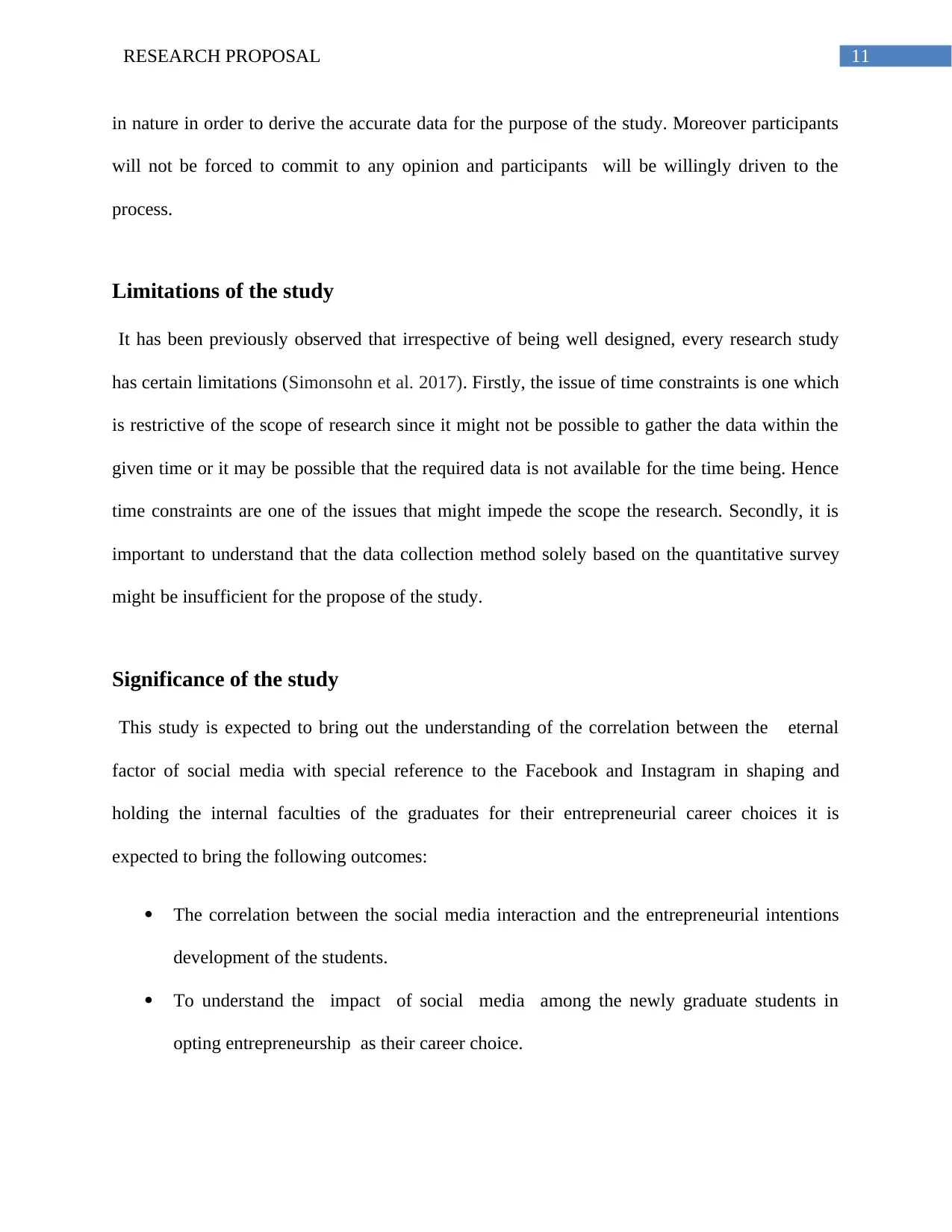
11RESEARCH PROPOSAL
in nature in order to derive the accurate data for the purpose of the study. Moreover participants
will not be forced to commit to any opinion and participants will be willingly driven to the
process.
Limitations of the study
It has been previously observed that irrespective of being well designed, every research study
has certain limitations (Simonsohn et al. 2017). Firstly, the issue of time constraints is one which
is restrictive of the scope of research since it might not be possible to gather the data within the
given time or it may be possible that the required data is not available for the time being. Hence
time constraints are one of the issues that might impede the scope the research. Secondly, it is
important to understand that the data collection method solely based on the quantitative survey
might be insufficient for the propose of the study.
Significance of the study
This study is expected to bring out the understanding of the correlation between the eternal
factor of social media with special reference to the Facebook and Instagram in shaping and
holding the internal faculties of the graduates for their entrepreneurial career choices it is
expected to bring the following outcomes:
The correlation between the social media interaction and the entrepreneurial intentions
development of the students.
To understand the impact of social media among the newly graduate students in
opting entrepreneurship as their career choice.
in nature in order to derive the accurate data for the purpose of the study. Moreover participants
will not be forced to commit to any opinion and participants will be willingly driven to the
process.
Limitations of the study
It has been previously observed that irrespective of being well designed, every research study
has certain limitations (Simonsohn et al. 2017). Firstly, the issue of time constraints is one which
is restrictive of the scope of research since it might not be possible to gather the data within the
given time or it may be possible that the required data is not available for the time being. Hence
time constraints are one of the issues that might impede the scope the research. Secondly, it is
important to understand that the data collection method solely based on the quantitative survey
might be insufficient for the propose of the study.
Significance of the study
This study is expected to bring out the understanding of the correlation between the eternal
factor of social media with special reference to the Facebook and Instagram in shaping and
holding the internal faculties of the graduates for their entrepreneurial career choices it is
expected to bring the following outcomes:
The correlation between the social media interaction and the entrepreneurial intentions
development of the students.
To understand the impact of social media among the newly graduate students in
opting entrepreneurship as their career choice.
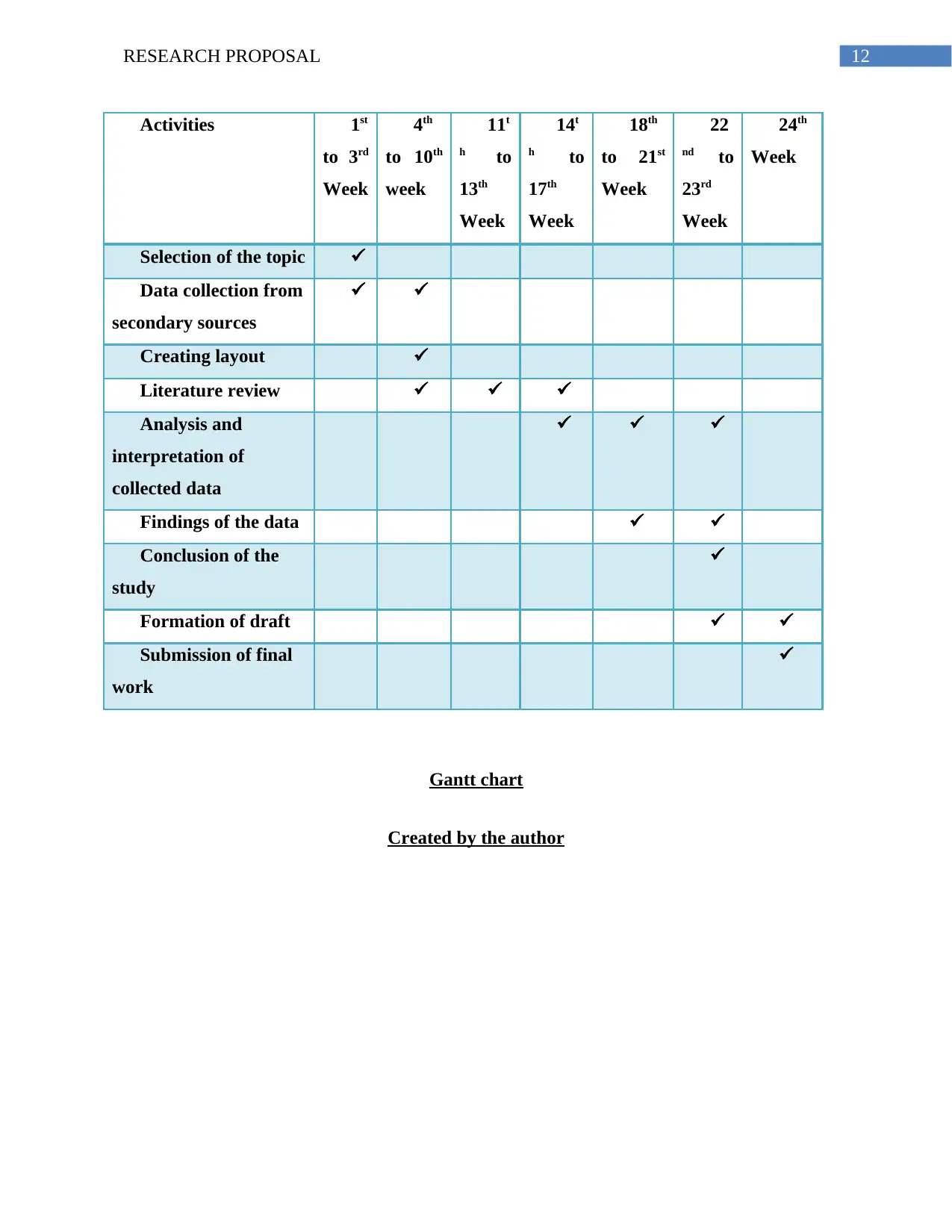
12RESEARCH PROPOSAL
Activities 1st
to 3rd
Week
4th
to 10th
week
11t
h to
13th
Week
14t
h to
17th
Week
18th
to 21st
Week
22
nd to
23rd
Week
24th
Week
Selection of the topic
Data collection from
secondary sources
Creating layout
Literature review
Analysis and
interpretation of
collected data
Findings of the data
Conclusion of the
study
Formation of draft
Submission of final
work
Gantt chart
Created by the author
Activities 1st
to 3rd
Week
4th
to 10th
week
11t
h to
13th
Week
14t
h to
17th
Week
18th
to 21st
Week
22
nd to
23rd
Week
24th
Week
Selection of the topic
Data collection from
secondary sources
Creating layout
Literature review
Analysis and
interpretation of
collected data
Findings of the data
Conclusion of the
study
Formation of draft
Submission of final
work
Gantt chart
Created by the author
Paraphrase This Document
Need a fresh take? Get an instant paraphrase of this document with our AI Paraphraser
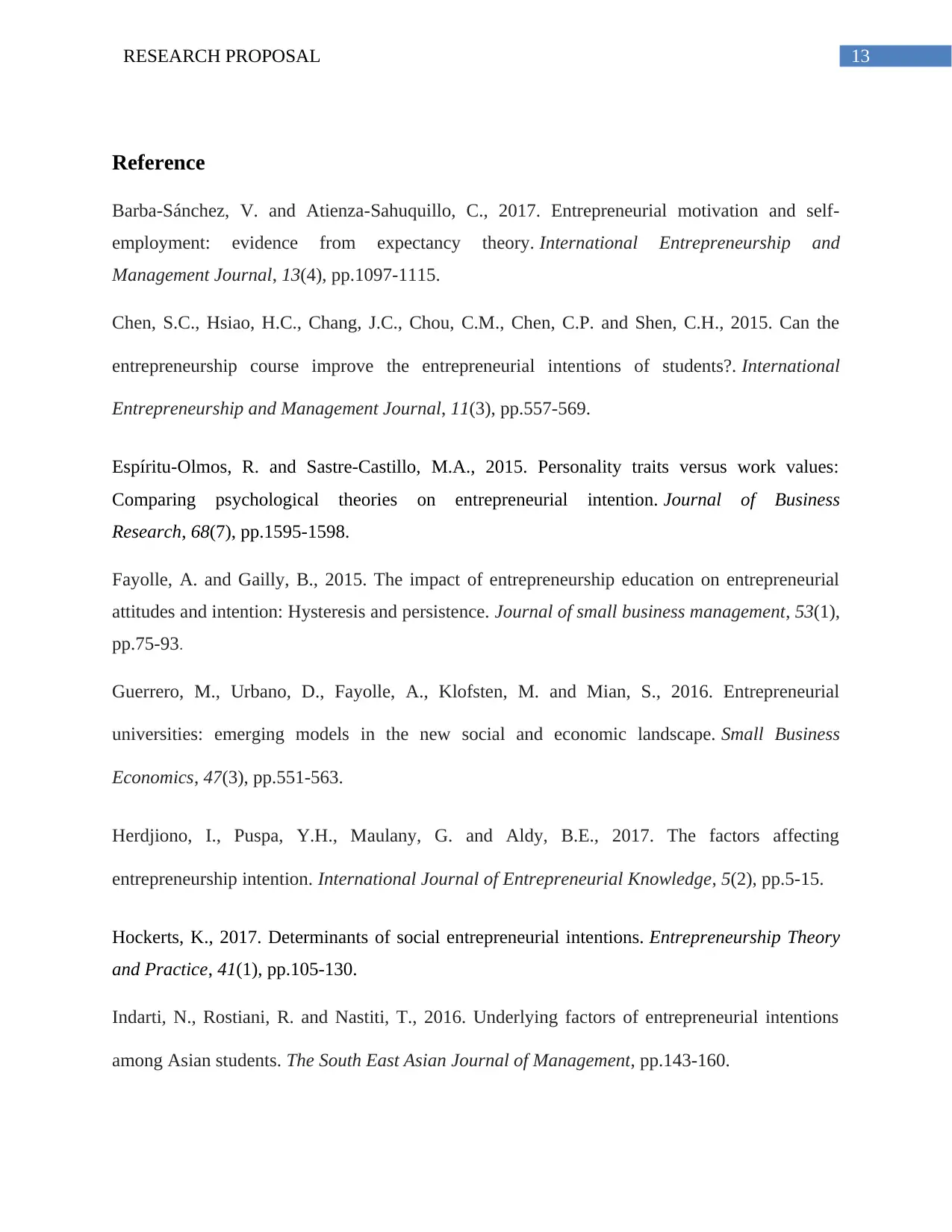
13RESEARCH PROPOSAL
Reference
Barba-Sánchez, V. and Atienza-Sahuquillo, C., 2017. Entrepreneurial motivation and self-
employment: evidence from expectancy theory. International Entrepreneurship and
Management Journal, 13(4), pp.1097-1115.
Chen, S.C., Hsiao, H.C., Chang, J.C., Chou, C.M., Chen, C.P. and Shen, C.H., 2015. Can the
entrepreneurship course improve the entrepreneurial intentions of students?. International
Entrepreneurship and Management Journal, 11(3), pp.557-569.
Espíritu-Olmos, R. and Sastre-Castillo, M.A., 2015. Personality traits versus work values:
Comparing psychological theories on entrepreneurial intention. Journal of Business
Research, 68(7), pp.1595-1598.
Fayolle, A. and Gailly, B., 2015. The impact of entrepreneurship education on entrepreneurial
attitudes and intention: Hysteresis and persistence. Journal of small business management, 53(1),
pp.75-93.
Guerrero, M., Urbano, D., Fayolle, A., Klofsten, M. and Mian, S., 2016. Entrepreneurial
universities: emerging models in the new social and economic landscape. Small Business
Economics, 47(3), pp.551-563.
Herdjiono, I., Puspa, Y.H., Maulany, G. and Aldy, B.E., 2017. The factors affecting
entrepreneurship intention. International Journal of Entrepreneurial Knowledge, 5(2), pp.5-15.
Hockerts, K., 2017. Determinants of social entrepreneurial intentions. Entrepreneurship Theory
and Practice, 41(1), pp.105-130.
Indarti, N., Rostiani, R. and Nastiti, T., 2016. Underlying factors of entrepreneurial intentions
among Asian students. The South East Asian Journal of Management, pp.143-160.
Reference
Barba-Sánchez, V. and Atienza-Sahuquillo, C., 2017. Entrepreneurial motivation and self-
employment: evidence from expectancy theory. International Entrepreneurship and
Management Journal, 13(4), pp.1097-1115.
Chen, S.C., Hsiao, H.C., Chang, J.C., Chou, C.M., Chen, C.P. and Shen, C.H., 2015. Can the
entrepreneurship course improve the entrepreneurial intentions of students?. International
Entrepreneurship and Management Journal, 11(3), pp.557-569.
Espíritu-Olmos, R. and Sastre-Castillo, M.A., 2015. Personality traits versus work values:
Comparing psychological theories on entrepreneurial intention. Journal of Business
Research, 68(7), pp.1595-1598.
Fayolle, A. and Gailly, B., 2015. The impact of entrepreneurship education on entrepreneurial
attitudes and intention: Hysteresis and persistence. Journal of small business management, 53(1),
pp.75-93.
Guerrero, M., Urbano, D., Fayolle, A., Klofsten, M. and Mian, S., 2016. Entrepreneurial
universities: emerging models in the new social and economic landscape. Small Business
Economics, 47(3), pp.551-563.
Herdjiono, I., Puspa, Y.H., Maulany, G. and Aldy, B.E., 2017. The factors affecting
entrepreneurship intention. International Journal of Entrepreneurial Knowledge, 5(2), pp.5-15.
Hockerts, K., 2017. Determinants of social entrepreneurial intentions. Entrepreneurship Theory
and Practice, 41(1), pp.105-130.
Indarti, N., Rostiani, R. and Nastiti, T., 2016. Underlying factors of entrepreneurial intentions
among Asian students. The South East Asian Journal of Management, pp.143-160.
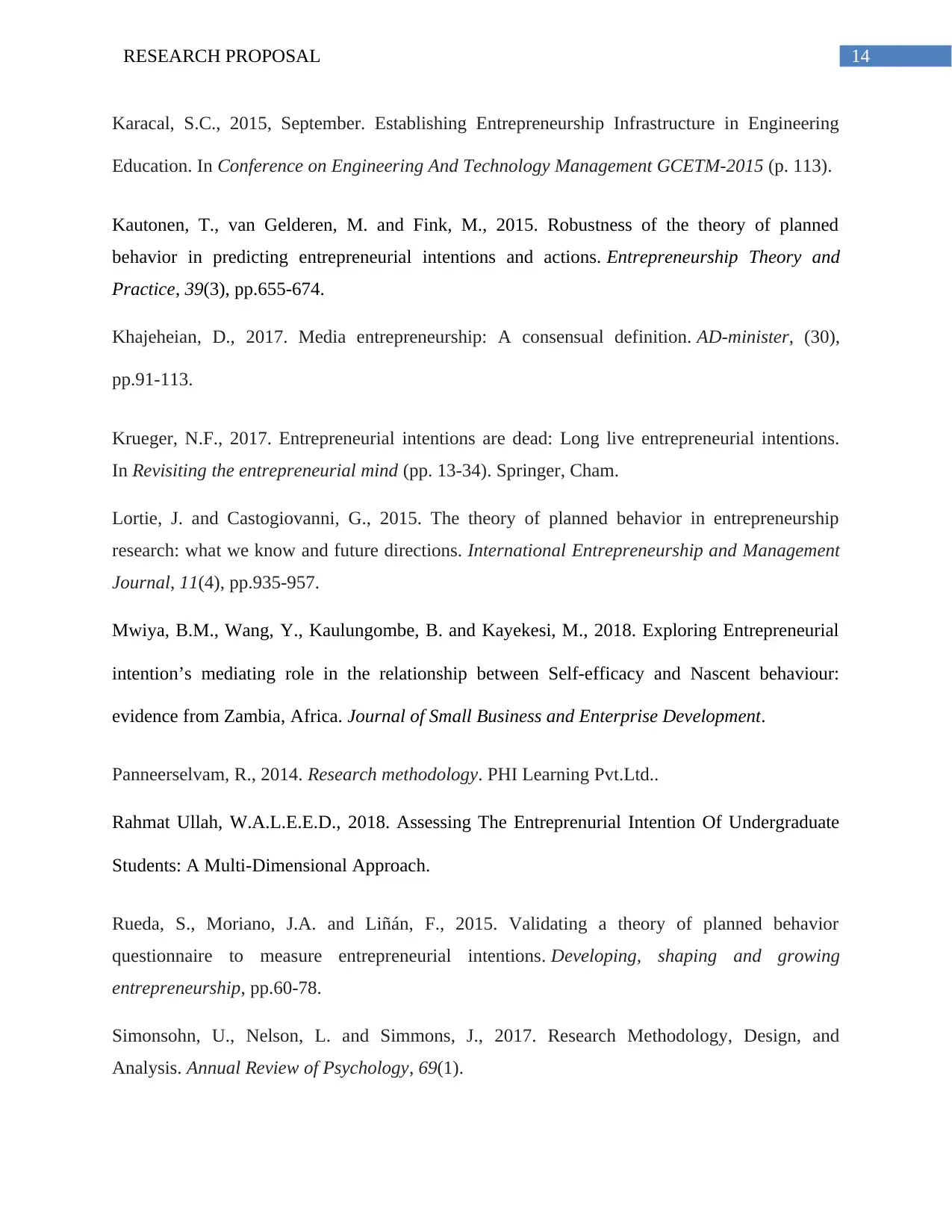
14RESEARCH PROPOSAL
Karacal, S.C., 2015, September. Establishing Entrepreneurship Infrastructure in Engineering
Education. In Conference on Engineering And Technology Management GCETM-2015 (p. 113).
Kautonen, T., van Gelderen, M. and Fink, M., 2015. Robustness of the theory of planned
behavior in predicting entrepreneurial intentions and actions. Entrepreneurship Theory and
Practice, 39(3), pp.655-674.
Khajeheian, D., 2017. Media entrepreneurship: A consensual definition. AD-minister, (30),
pp.91-113.
Krueger, N.F., 2017. Entrepreneurial intentions are dead: Long live entrepreneurial intentions.
In Revisiting the entrepreneurial mind (pp. 13-34). Springer, Cham.
Lortie, J. and Castogiovanni, G., 2015. The theory of planned behavior in entrepreneurship
research: what we know and future directions. International Entrepreneurship and Management
Journal, 11(4), pp.935-957.
Mwiya, B.M., Wang, Y., Kaulungombe, B. and Kayekesi, M., 2018. Exploring Entrepreneurial
intention’s mediating role in the relationship between Self-efficacy and Nascent behaviour:
evidence from Zambia, Africa. Journal of Small Business and Enterprise Development.
Panneerselvam, R., 2014. Research methodology. PHI Learning Pvt.Ltd..
Rahmat Ullah, W.A.L.E.E.D., 2018. Assessing The Entreprenurial Intention Of Undergraduate
Students: A Multi-Dimensional Approach.
Rueda, S., Moriano, J.A. and Liñán, F., 2015. Validating a theory of planned behavior
questionnaire to measure entrepreneurial intentions. Developing, shaping and growing
entrepreneurship, pp.60-78.
Simonsohn, U., Nelson, L. and Simmons, J., 2017. Research Methodology, Design, and
Analysis. Annual Review of Psychology, 69(1).
Karacal, S.C., 2015, September. Establishing Entrepreneurship Infrastructure in Engineering
Education. In Conference on Engineering And Technology Management GCETM-2015 (p. 113).
Kautonen, T., van Gelderen, M. and Fink, M., 2015. Robustness of the theory of planned
behavior in predicting entrepreneurial intentions and actions. Entrepreneurship Theory and
Practice, 39(3), pp.655-674.
Khajeheian, D., 2017. Media entrepreneurship: A consensual definition. AD-minister, (30),
pp.91-113.
Krueger, N.F., 2017. Entrepreneurial intentions are dead: Long live entrepreneurial intentions.
In Revisiting the entrepreneurial mind (pp. 13-34). Springer, Cham.
Lortie, J. and Castogiovanni, G., 2015. The theory of planned behavior in entrepreneurship
research: what we know and future directions. International Entrepreneurship and Management
Journal, 11(4), pp.935-957.
Mwiya, B.M., Wang, Y., Kaulungombe, B. and Kayekesi, M., 2018. Exploring Entrepreneurial
intention’s mediating role in the relationship between Self-efficacy and Nascent behaviour:
evidence from Zambia, Africa. Journal of Small Business and Enterprise Development.
Panneerselvam, R., 2014. Research methodology. PHI Learning Pvt.Ltd..
Rahmat Ullah, W.A.L.E.E.D., 2018. Assessing The Entreprenurial Intention Of Undergraduate
Students: A Multi-Dimensional Approach.
Rueda, S., Moriano, J.A. and Liñán, F., 2015. Validating a theory of planned behavior
questionnaire to measure entrepreneurial intentions. Developing, shaping and growing
entrepreneurship, pp.60-78.
Simonsohn, U., Nelson, L. and Simmons, J., 2017. Research Methodology, Design, and
Analysis. Annual Review of Psychology, 69(1).
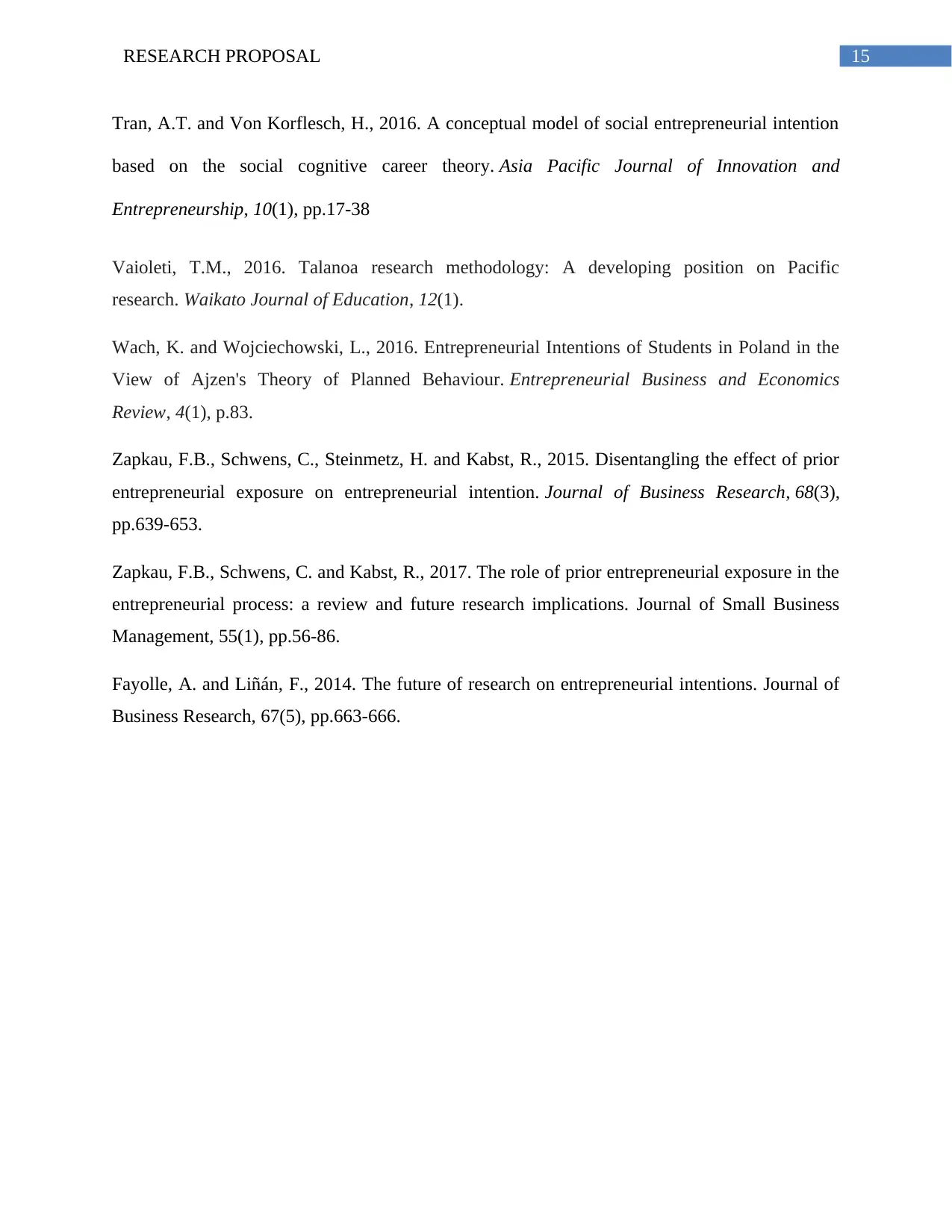
15RESEARCH PROPOSAL
Tran, A.T. and Von Korflesch, H., 2016. A conceptual model of social entrepreneurial intention
based on the social cognitive career theory. Asia Pacific Journal of Innovation and
Entrepreneurship, 10(1), pp.17-38
Vaioleti, T.M., 2016. Talanoa research methodology: A developing position on Pacific
research. Waikato Journal of Education, 12(1).
Wach, K. and Wojciechowski, L., 2016. Entrepreneurial Intentions of Students in Poland in the
View of Ajzen's Theory of Planned Behaviour. Entrepreneurial Business and Economics
Review, 4(1), p.83.
Zapkau, F.B., Schwens, C., Steinmetz, H. and Kabst, R., 2015. Disentangling the effect of prior
entrepreneurial exposure on entrepreneurial intention. Journal of Business Research, 68(3),
pp.639-653.
Zapkau, F.B., Schwens, C. and Kabst, R., 2017. The role of prior entrepreneurial exposure in the
entrepreneurial process: a review and future research implications. Journal of Small Business
Management, 55(1), pp.56-86.
Fayolle, A. and Liñán, F., 2014. The future of research on entrepreneurial intentions. Journal of
Business Research, 67(5), pp.663-666.
Tran, A.T. and Von Korflesch, H., 2016. A conceptual model of social entrepreneurial intention
based on the social cognitive career theory. Asia Pacific Journal of Innovation and
Entrepreneurship, 10(1), pp.17-38
Vaioleti, T.M., 2016. Talanoa research methodology: A developing position on Pacific
research. Waikato Journal of Education, 12(1).
Wach, K. and Wojciechowski, L., 2016. Entrepreneurial Intentions of Students in Poland in the
View of Ajzen's Theory of Planned Behaviour. Entrepreneurial Business and Economics
Review, 4(1), p.83.
Zapkau, F.B., Schwens, C., Steinmetz, H. and Kabst, R., 2015. Disentangling the effect of prior
entrepreneurial exposure on entrepreneurial intention. Journal of Business Research, 68(3),
pp.639-653.
Zapkau, F.B., Schwens, C. and Kabst, R., 2017. The role of prior entrepreneurial exposure in the
entrepreneurial process: a review and future research implications. Journal of Small Business
Management, 55(1), pp.56-86.
Fayolle, A. and Liñán, F., 2014. The future of research on entrepreneurial intentions. Journal of
Business Research, 67(5), pp.663-666.
Secure Best Marks with AI Grader
Need help grading? Try our AI Grader for instant feedback on your assignments.
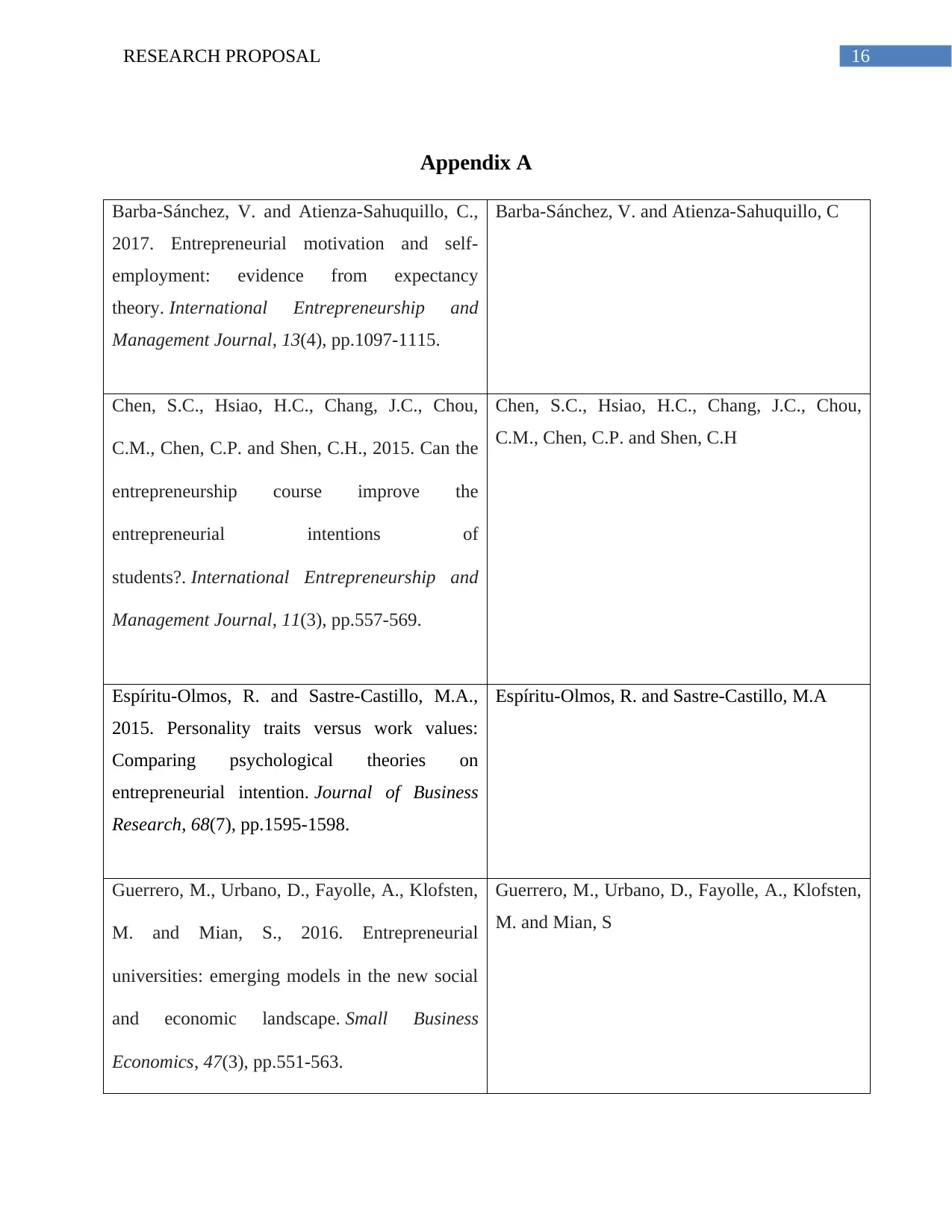
16RESEARCH PROPOSAL
Appendix A
Barba-Sánchez, V. and Atienza-Sahuquillo, C.,
2017. Entrepreneurial motivation and self-
employment: evidence from expectancy
theory. International Entrepreneurship and
Management Journal, 13(4), pp.1097-1115.
Barba-Sánchez, V. and Atienza-Sahuquillo, C
Chen, S.C., Hsiao, H.C., Chang, J.C., Chou,
C.M., Chen, C.P. and Shen, C.H., 2015. Can the
entrepreneurship course improve the
entrepreneurial intentions of
students?. International Entrepreneurship and
Management Journal, 11(3), pp.557-569.
Chen, S.C., Hsiao, H.C., Chang, J.C., Chou,
C.M., Chen, C.P. and Shen, C.H
Espíritu-Olmos, R. and Sastre-Castillo, M.A.,
2015. Personality traits versus work values:
Comparing psychological theories on
entrepreneurial intention. Journal of Business
Research, 68(7), pp.1595-1598.
Espíritu-Olmos, R. and Sastre-Castillo, M.A
Guerrero, M., Urbano, D., Fayolle, A., Klofsten,
M. and Mian, S., 2016. Entrepreneurial
universities: emerging models in the new social
and economic landscape. Small Business
Economics, 47(3), pp.551-563.
Guerrero, M., Urbano, D., Fayolle, A., Klofsten,
M. and Mian, S
Appendix A
Barba-Sánchez, V. and Atienza-Sahuquillo, C.,
2017. Entrepreneurial motivation and self-
employment: evidence from expectancy
theory. International Entrepreneurship and
Management Journal, 13(4), pp.1097-1115.
Barba-Sánchez, V. and Atienza-Sahuquillo, C
Chen, S.C., Hsiao, H.C., Chang, J.C., Chou,
C.M., Chen, C.P. and Shen, C.H., 2015. Can the
entrepreneurship course improve the
entrepreneurial intentions of
students?. International Entrepreneurship and
Management Journal, 11(3), pp.557-569.
Chen, S.C., Hsiao, H.C., Chang, J.C., Chou,
C.M., Chen, C.P. and Shen, C.H
Espíritu-Olmos, R. and Sastre-Castillo, M.A.,
2015. Personality traits versus work values:
Comparing psychological theories on
entrepreneurial intention. Journal of Business
Research, 68(7), pp.1595-1598.
Espíritu-Olmos, R. and Sastre-Castillo, M.A
Guerrero, M., Urbano, D., Fayolle, A., Klofsten,
M. and Mian, S., 2016. Entrepreneurial
universities: emerging models in the new social
and economic landscape. Small Business
Economics, 47(3), pp.551-563.
Guerrero, M., Urbano, D., Fayolle, A., Klofsten,
M. and Mian, S
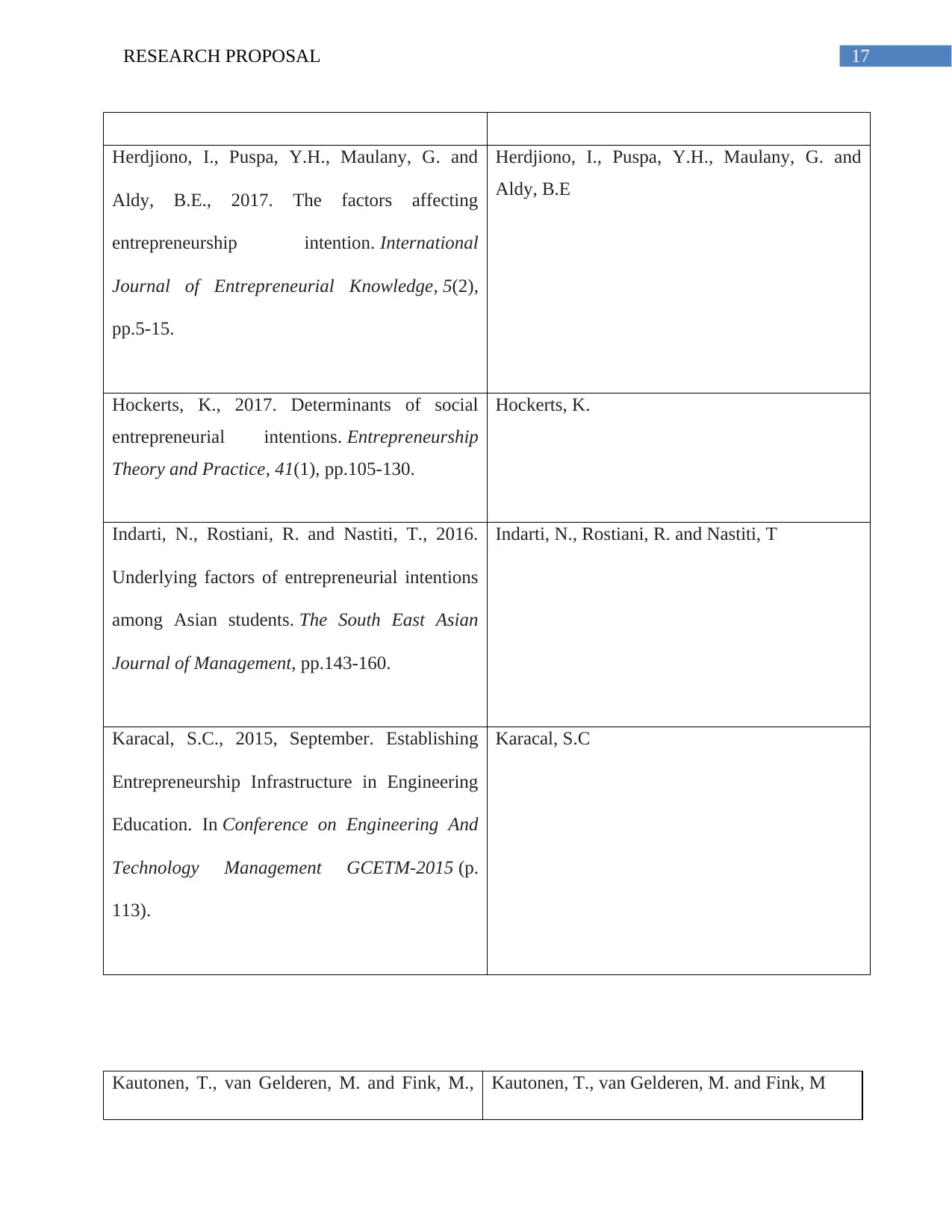
17RESEARCH PROPOSAL
Herdjiono, I., Puspa, Y.H., Maulany, G. and
Aldy, B.E., 2017. The factors affecting
entrepreneurship intention. International
Journal of Entrepreneurial Knowledge, 5(2),
pp.5-15.
Herdjiono, I., Puspa, Y.H., Maulany, G. and
Aldy, B.E
Hockerts, K., 2017. Determinants of social
entrepreneurial intentions. Entrepreneurship
Theory and Practice, 41(1), pp.105-130.
Hockerts, K.
Indarti, N., Rostiani, R. and Nastiti, T., 2016.
Underlying factors of entrepreneurial intentions
among Asian students. The South East Asian
Journal of Management, pp.143-160.
Indarti, N., Rostiani, R. and Nastiti, T
Karacal, S.C., 2015, September. Establishing
Entrepreneurship Infrastructure in Engineering
Education. In Conference on Engineering And
Technology Management GCETM-2015 (p.
113).
Karacal, S.C
Kautonen, T., van Gelderen, M. and Fink, M., Kautonen, T., van Gelderen, M. and Fink, M
Herdjiono, I., Puspa, Y.H., Maulany, G. and
Aldy, B.E., 2017. The factors affecting
entrepreneurship intention. International
Journal of Entrepreneurial Knowledge, 5(2),
pp.5-15.
Herdjiono, I., Puspa, Y.H., Maulany, G. and
Aldy, B.E
Hockerts, K., 2017. Determinants of social
entrepreneurial intentions. Entrepreneurship
Theory and Practice, 41(1), pp.105-130.
Hockerts, K.
Indarti, N., Rostiani, R. and Nastiti, T., 2016.
Underlying factors of entrepreneurial intentions
among Asian students. The South East Asian
Journal of Management, pp.143-160.
Indarti, N., Rostiani, R. and Nastiti, T
Karacal, S.C., 2015, September. Establishing
Entrepreneurship Infrastructure in Engineering
Education. In Conference on Engineering And
Technology Management GCETM-2015 (p.
113).
Karacal, S.C
Kautonen, T., van Gelderen, M. and Fink, M., Kautonen, T., van Gelderen, M. and Fink, M
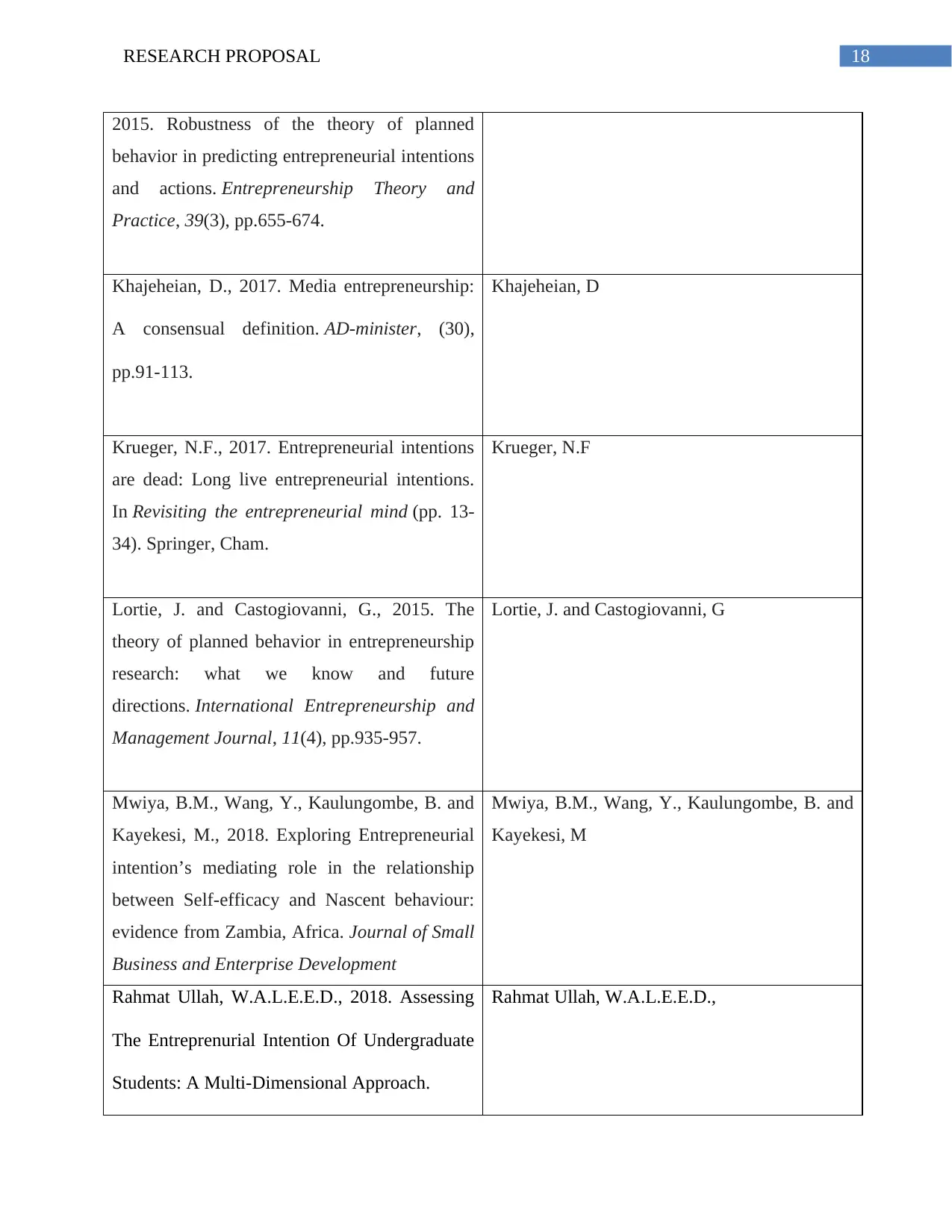
18RESEARCH PROPOSAL
2015. Robustness of the theory of planned
behavior in predicting entrepreneurial intentions
and actions. Entrepreneurship Theory and
Practice, 39(3), pp.655-674.
Khajeheian, D., 2017. Media entrepreneurship:
A consensual definition. AD-minister, (30),
pp.91-113.
Khajeheian, D
Krueger, N.F., 2017. Entrepreneurial intentions
are dead: Long live entrepreneurial intentions.
In Revisiting the entrepreneurial mind (pp. 13-
34). Springer, Cham.
Krueger, N.F
Lortie, J. and Castogiovanni, G., 2015. The
theory of planned behavior in entrepreneurship
research: what we know and future
directions. International Entrepreneurship and
Management Journal, 11(4), pp.935-957.
Lortie, J. and Castogiovanni, G
Mwiya, B.M., Wang, Y., Kaulungombe, B. and
Kayekesi, M., 2018. Exploring Entrepreneurial
intention’s mediating role in the relationship
between Self-efficacy and Nascent behaviour:
evidence from Zambia, Africa. Journal of Small
Business and Enterprise Development
Mwiya, B.M., Wang, Y., Kaulungombe, B. and
Kayekesi, M
Rahmat Ullah, W.A.L.E.E.D., 2018. Assessing
The Entreprenurial Intention Of Undergraduate
Students: A Multi-Dimensional Approach.
Rahmat Ullah, W.A.L.E.E.D.,
2015. Robustness of the theory of planned
behavior in predicting entrepreneurial intentions
and actions. Entrepreneurship Theory and
Practice, 39(3), pp.655-674.
Khajeheian, D., 2017. Media entrepreneurship:
A consensual definition. AD-minister, (30),
pp.91-113.
Khajeheian, D
Krueger, N.F., 2017. Entrepreneurial intentions
are dead: Long live entrepreneurial intentions.
In Revisiting the entrepreneurial mind (pp. 13-
34). Springer, Cham.
Krueger, N.F
Lortie, J. and Castogiovanni, G., 2015. The
theory of planned behavior in entrepreneurship
research: what we know and future
directions. International Entrepreneurship and
Management Journal, 11(4), pp.935-957.
Lortie, J. and Castogiovanni, G
Mwiya, B.M., Wang, Y., Kaulungombe, B. and
Kayekesi, M., 2018. Exploring Entrepreneurial
intention’s mediating role in the relationship
between Self-efficacy and Nascent behaviour:
evidence from Zambia, Africa. Journal of Small
Business and Enterprise Development
Mwiya, B.M., Wang, Y., Kaulungombe, B. and
Kayekesi, M
Rahmat Ullah, W.A.L.E.E.D., 2018. Assessing
The Entreprenurial Intention Of Undergraduate
Students: A Multi-Dimensional Approach.
Rahmat Ullah, W.A.L.E.E.D.,
Paraphrase This Document
Need a fresh take? Get an instant paraphrase of this document with our AI Paraphraser
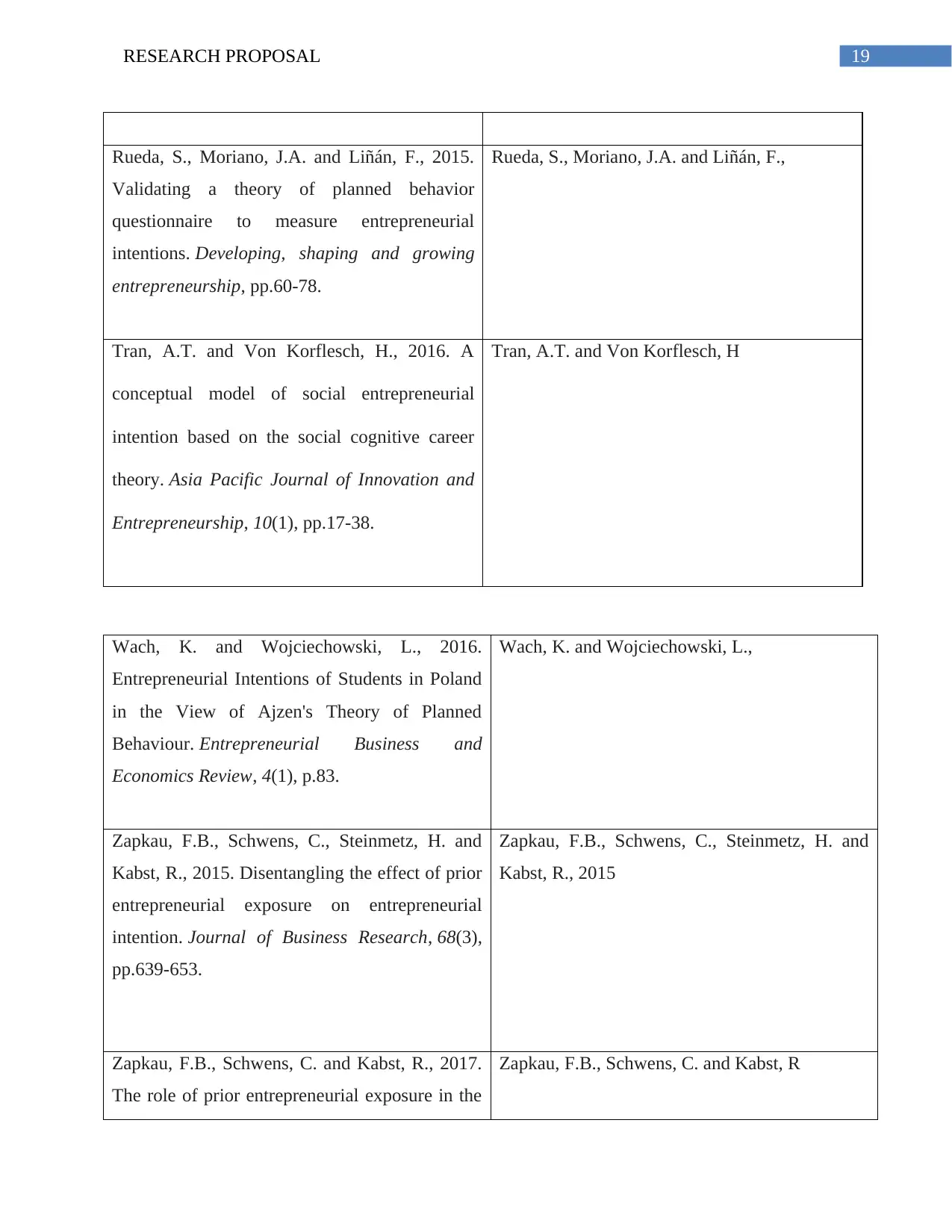
19RESEARCH PROPOSAL
Rueda, S., Moriano, J.A. and Liñán, F., 2015.
Validating a theory of planned behavior
questionnaire to measure entrepreneurial
intentions. Developing, shaping and growing
entrepreneurship, pp.60-78.
Rueda, S., Moriano, J.A. and Liñán, F.,
Tran, A.T. and Von Korflesch, H., 2016. A
conceptual model of social entrepreneurial
intention based on the social cognitive career
theory. Asia Pacific Journal of Innovation and
Entrepreneurship, 10(1), pp.17-38.
Tran, A.T. and Von Korflesch, H
Wach, K. and Wojciechowski, L., 2016.
Entrepreneurial Intentions of Students in Poland
in the View of Ajzen's Theory of Planned
Behaviour. Entrepreneurial Business and
Economics Review, 4(1), p.83.
Wach, K. and Wojciechowski, L.,
Zapkau, F.B., Schwens, C., Steinmetz, H. and
Kabst, R., 2015. Disentangling the effect of prior
entrepreneurial exposure on entrepreneurial
intention. Journal of Business Research, 68(3),
pp.639-653.
Zapkau, F.B., Schwens, C., Steinmetz, H. and
Kabst, R., 2015
Zapkau, F.B., Schwens, C. and Kabst, R., 2017.
The role of prior entrepreneurial exposure in the
Zapkau, F.B., Schwens, C. and Kabst, R
Rueda, S., Moriano, J.A. and Liñán, F., 2015.
Validating a theory of planned behavior
questionnaire to measure entrepreneurial
intentions. Developing, shaping and growing
entrepreneurship, pp.60-78.
Rueda, S., Moriano, J.A. and Liñán, F.,
Tran, A.T. and Von Korflesch, H., 2016. A
conceptual model of social entrepreneurial
intention based on the social cognitive career
theory. Asia Pacific Journal of Innovation and
Entrepreneurship, 10(1), pp.17-38.
Tran, A.T. and Von Korflesch, H
Wach, K. and Wojciechowski, L., 2016.
Entrepreneurial Intentions of Students in Poland
in the View of Ajzen's Theory of Planned
Behaviour. Entrepreneurial Business and
Economics Review, 4(1), p.83.
Wach, K. and Wojciechowski, L.,
Zapkau, F.B., Schwens, C., Steinmetz, H. and
Kabst, R., 2015. Disentangling the effect of prior
entrepreneurial exposure on entrepreneurial
intention. Journal of Business Research, 68(3),
pp.639-653.
Zapkau, F.B., Schwens, C., Steinmetz, H. and
Kabst, R., 2015
Zapkau, F.B., Schwens, C. and Kabst, R., 2017.
The role of prior entrepreneurial exposure in the
Zapkau, F.B., Schwens, C. and Kabst, R

20RESEARCH PROPOSAL
entrepreneurial process: a review and future
research implications. Journal of Small Business
Management, 55(1), pp.56-86.
Fayolle, A. and Liñán, F., 2014. The future of
research on entrepreneurial intentions. Journal of
Business Research, 67(5), pp.663-666.
Fayolle, A. and Liñán, F
entrepreneurial process: a review and future
research implications. Journal of Small Business
Management, 55(1), pp.56-86.
Fayolle, A. and Liñán, F., 2014. The future of
research on entrepreneurial intentions. Journal of
Business Research, 67(5), pp.663-666.
Fayolle, A. and Liñán, F
1 out of 21
Related Documents
Your All-in-One AI-Powered Toolkit for Academic Success.
+13062052269
info@desklib.com
Available 24*7 on WhatsApp / Email
![[object Object]](/_next/static/media/star-bottom.7253800d.svg)
Unlock your academic potential
© 2024 | Zucol Services PVT LTD | All rights reserved.




